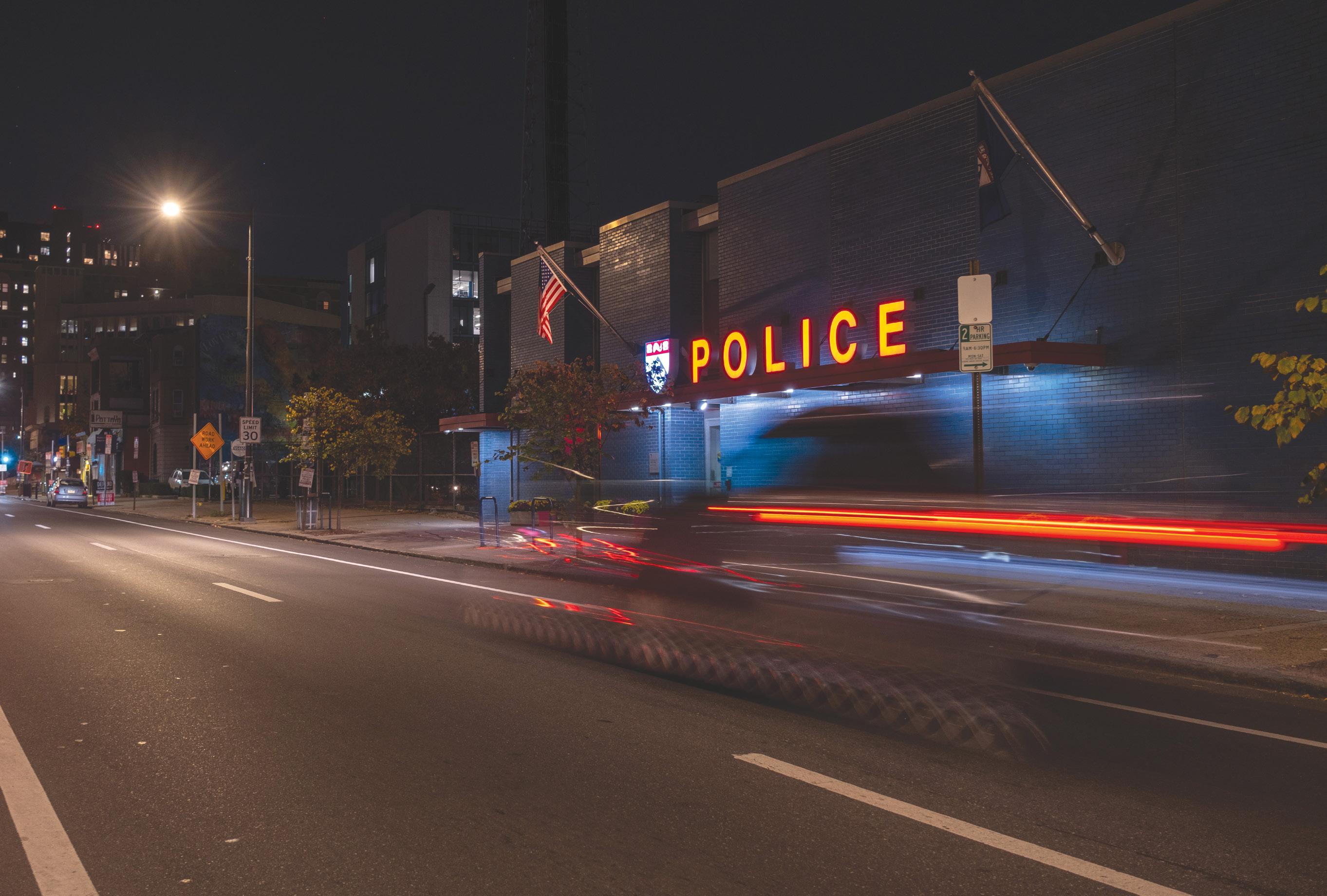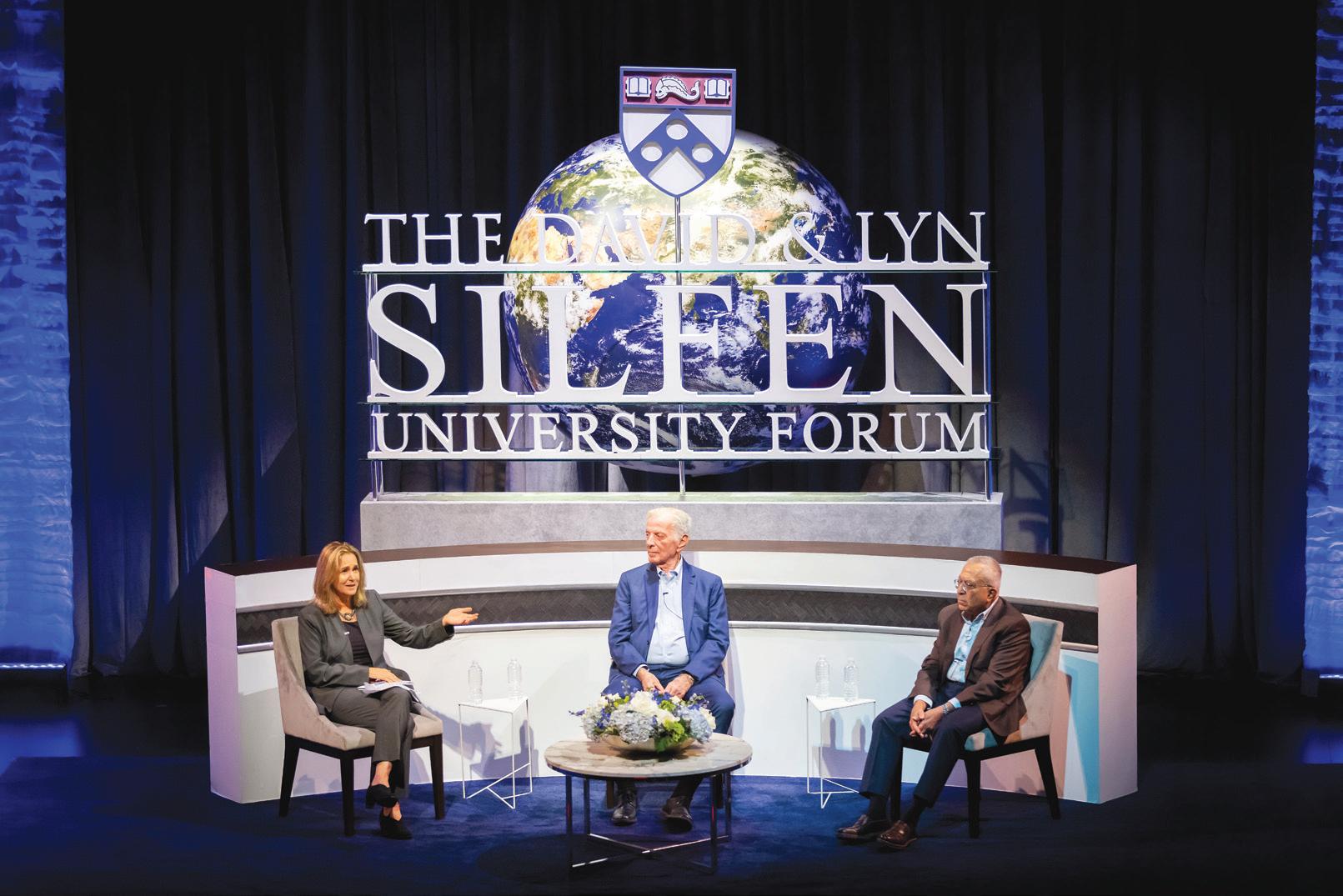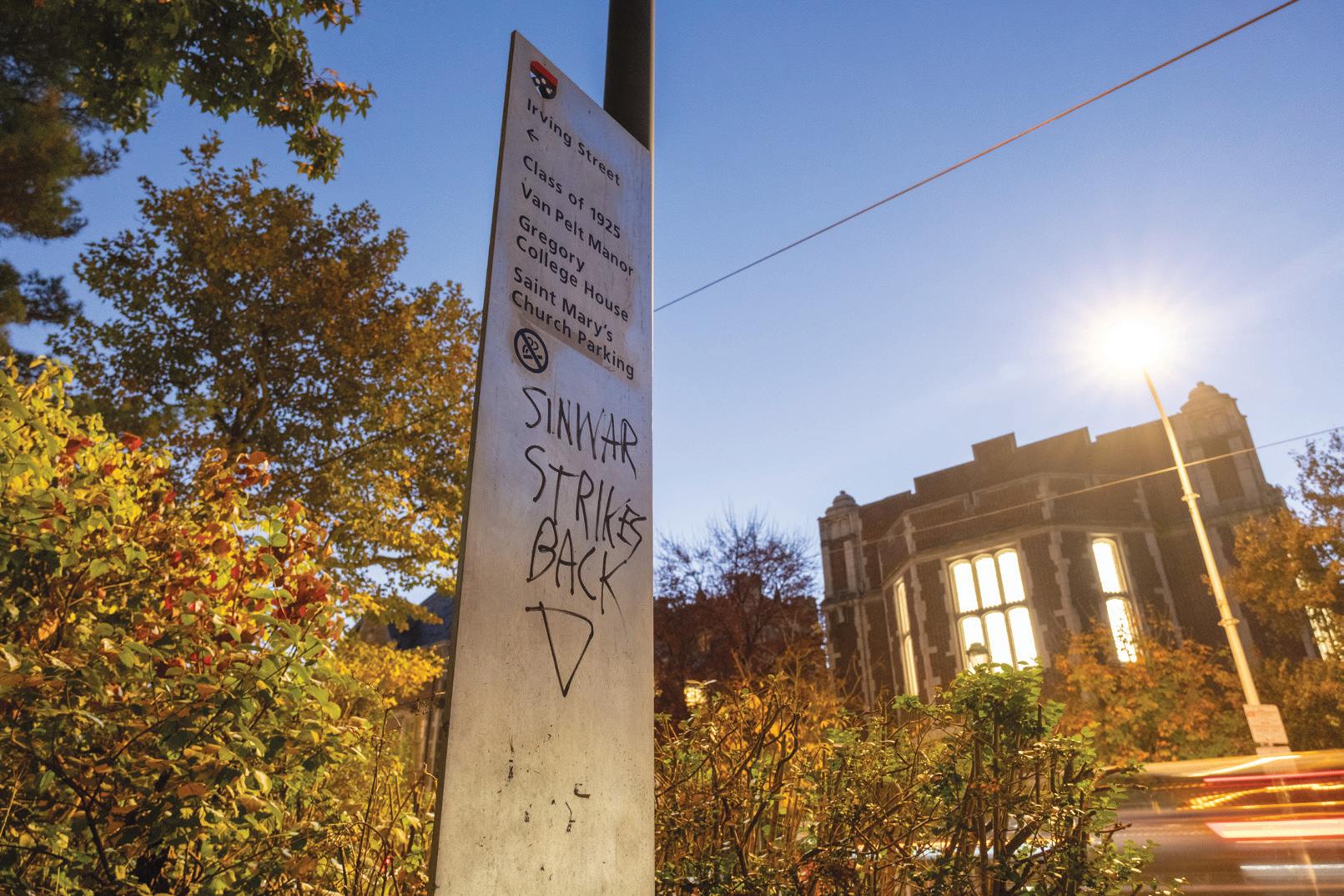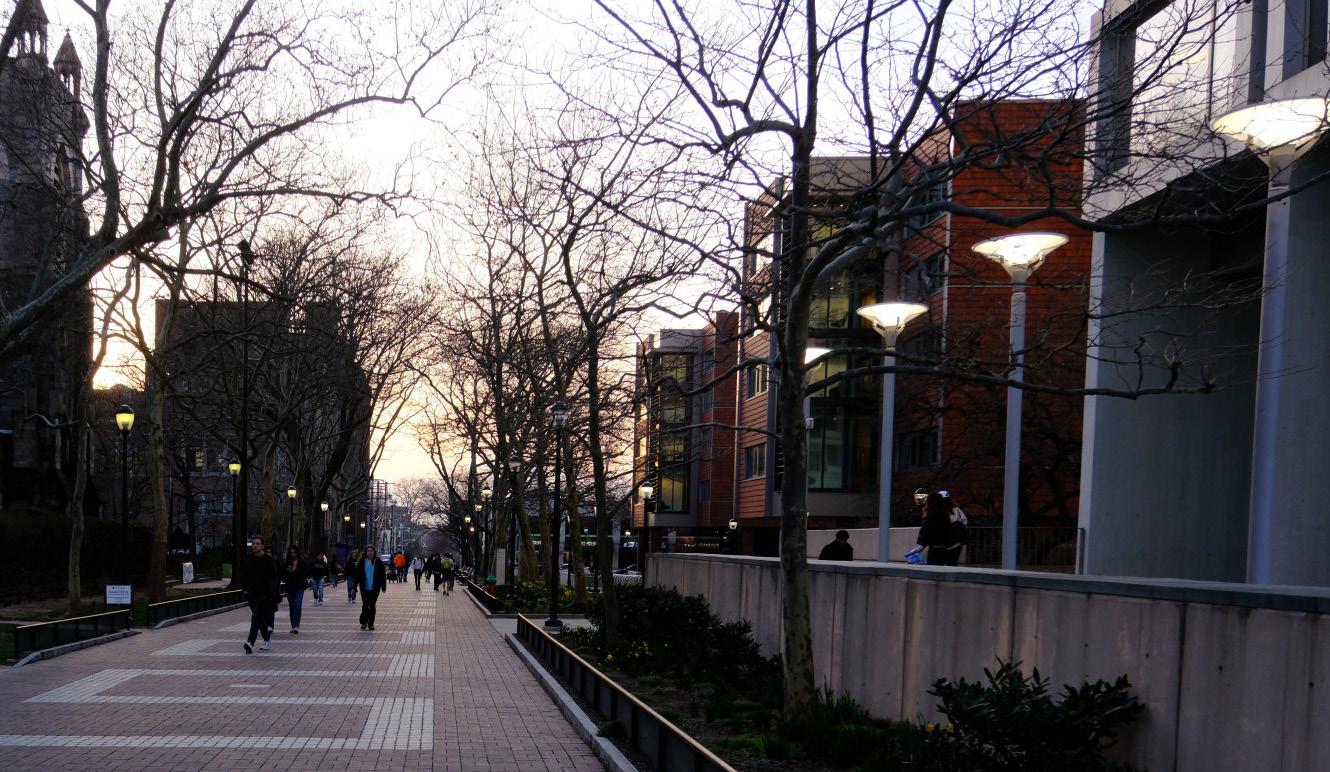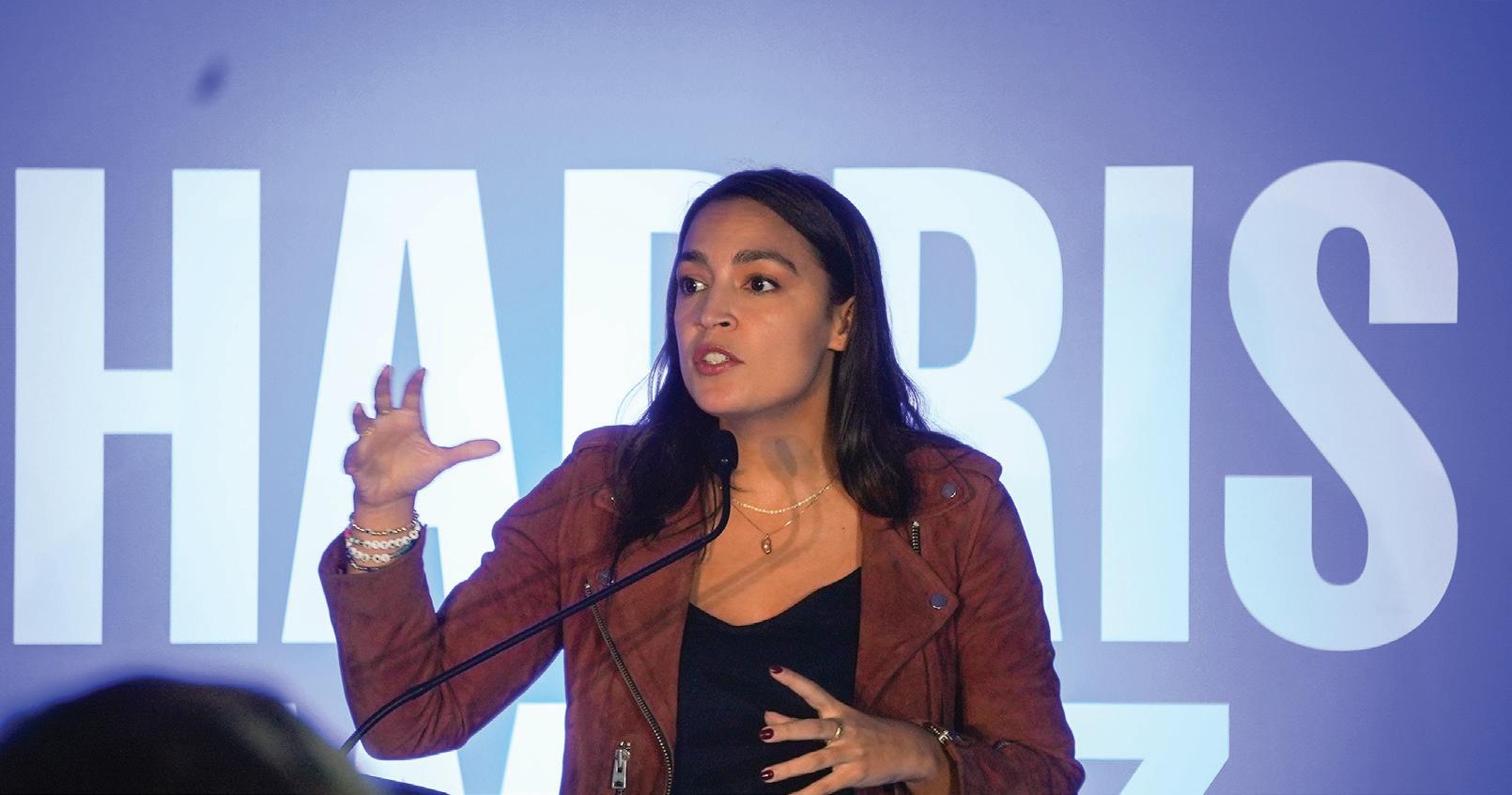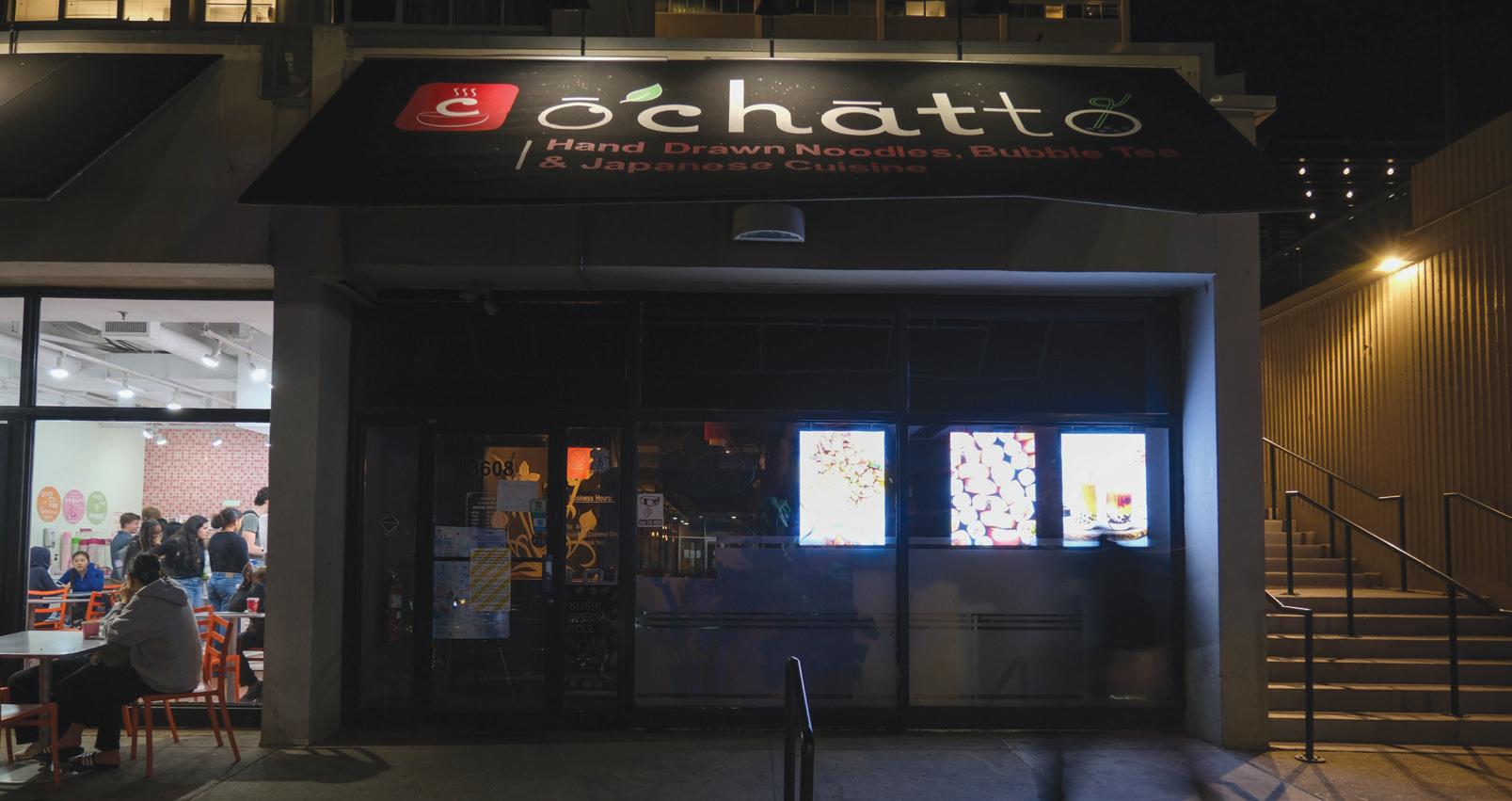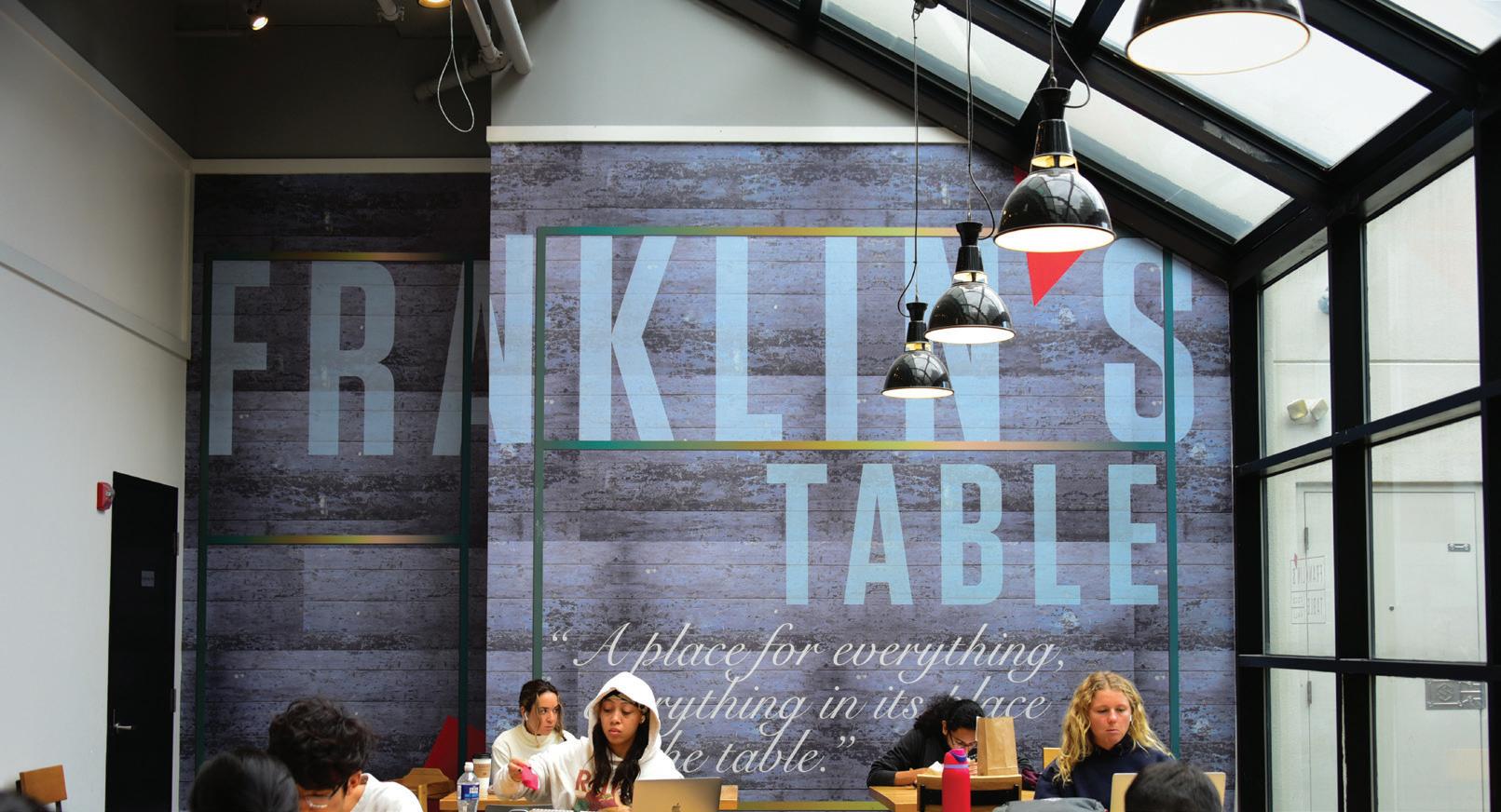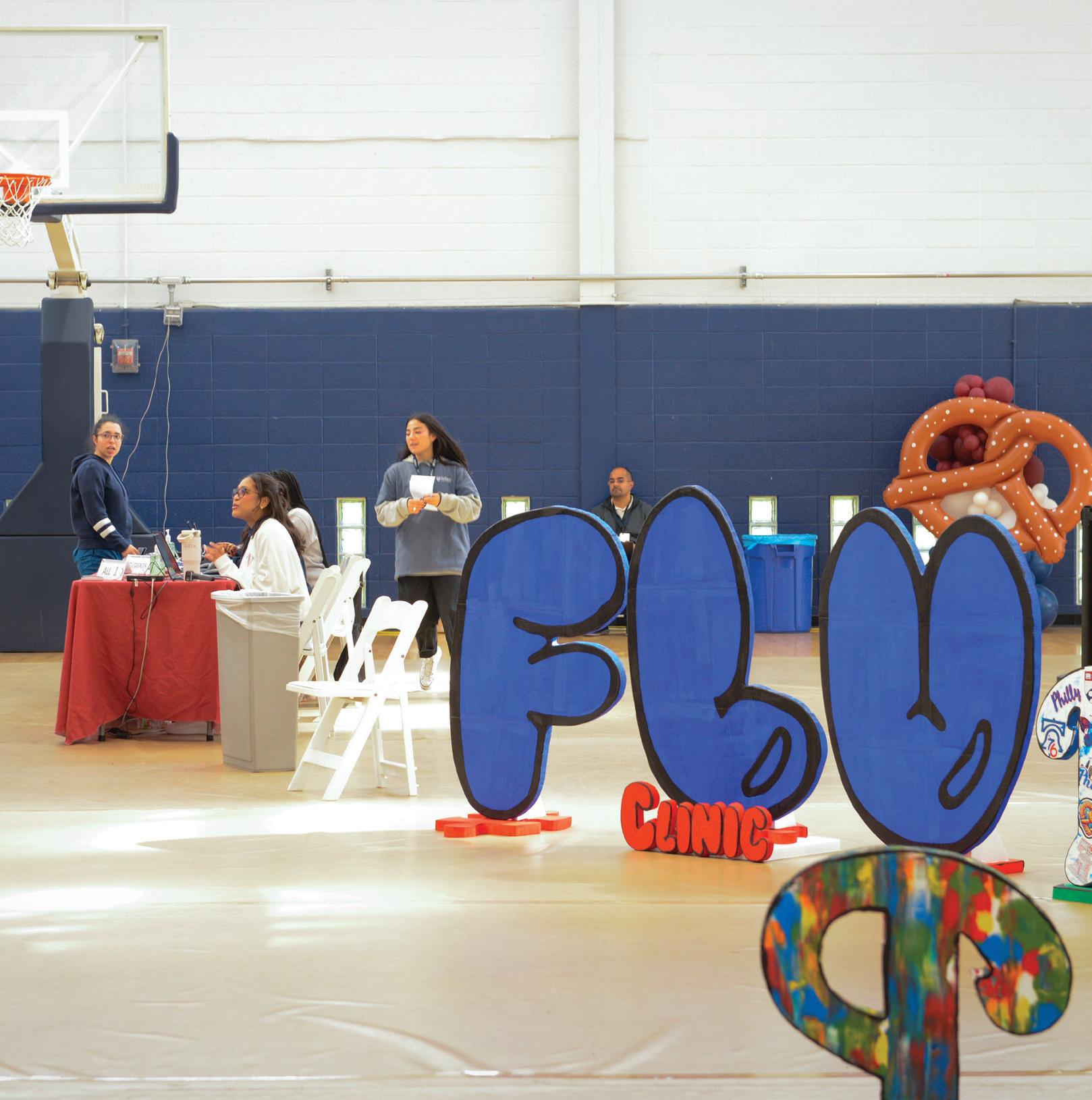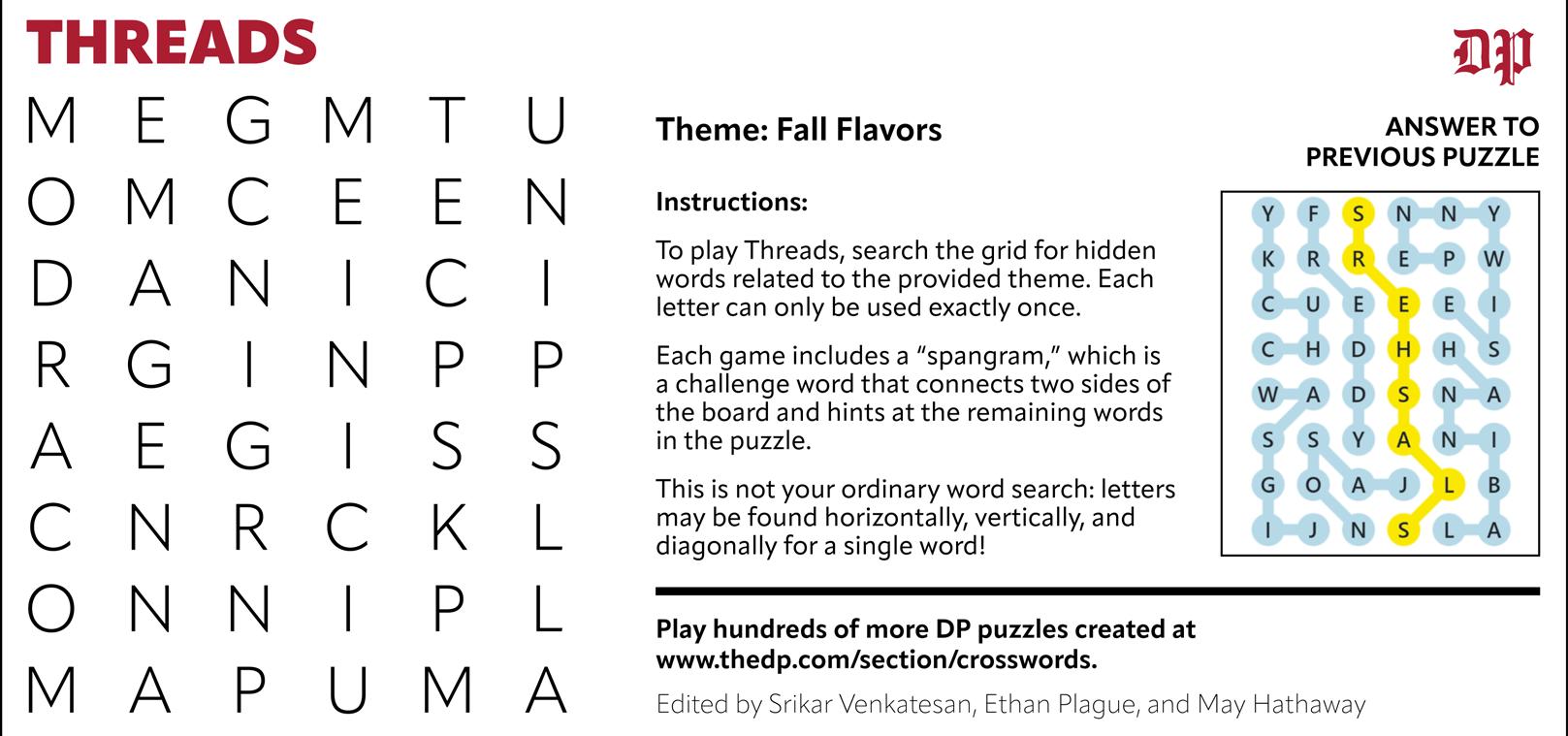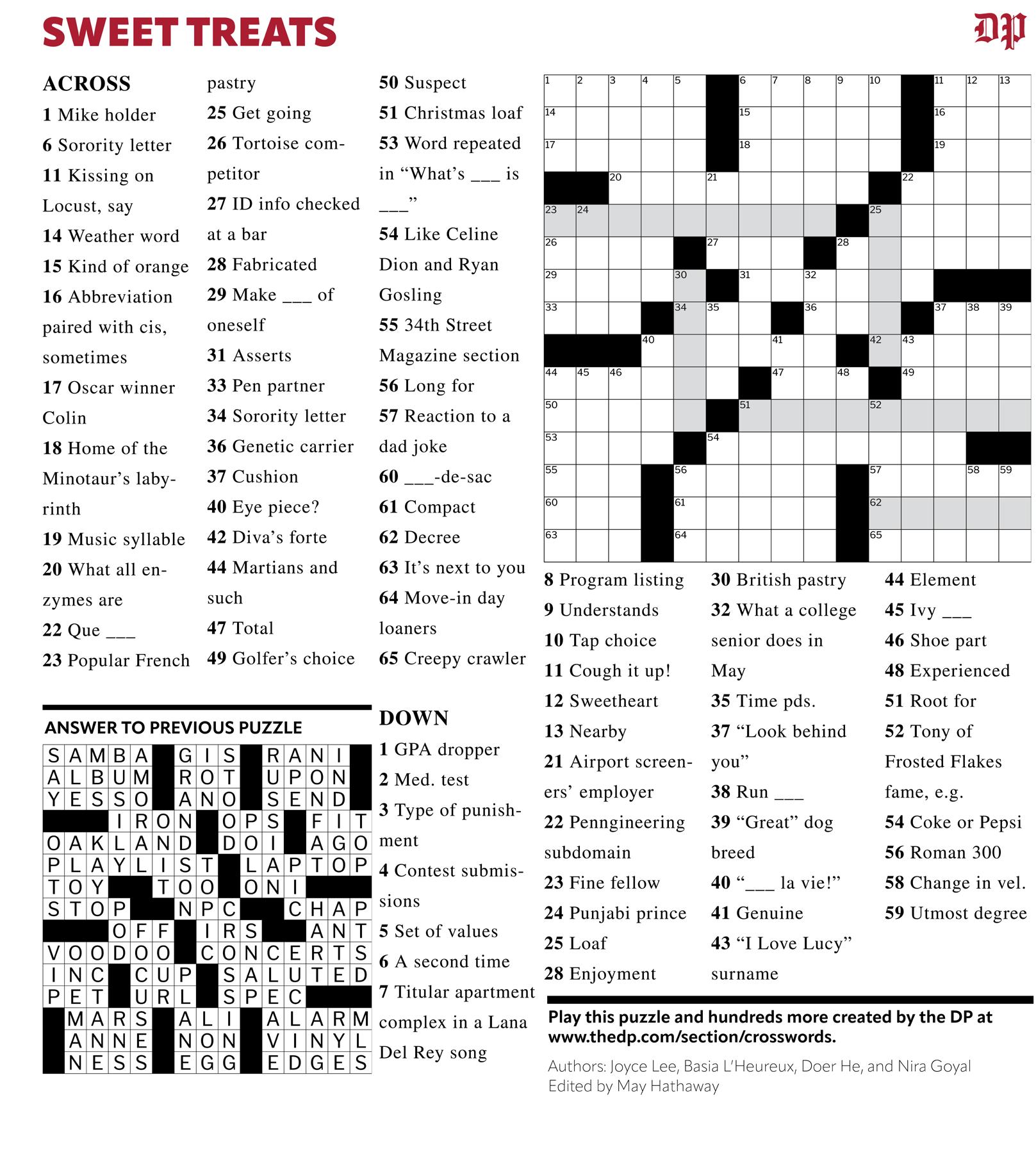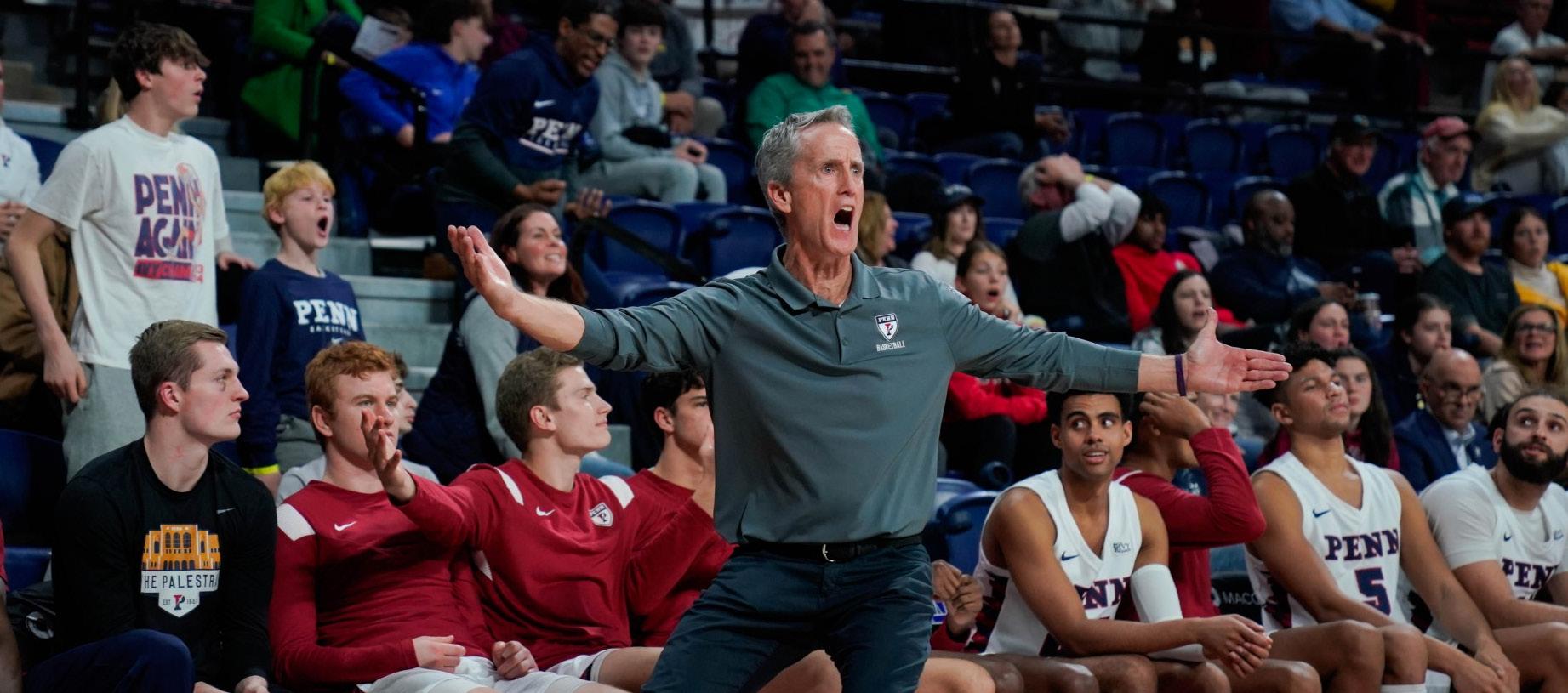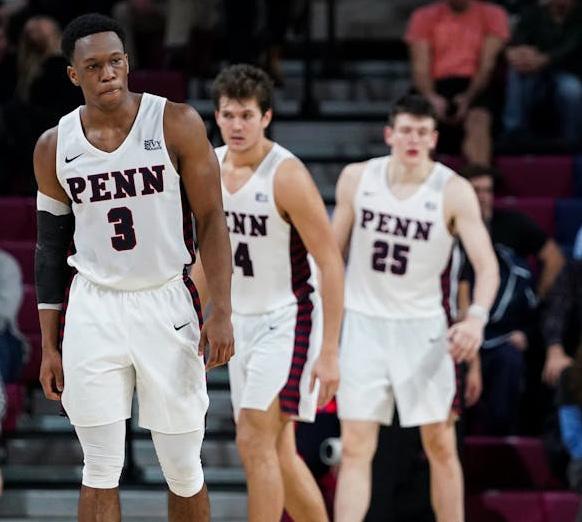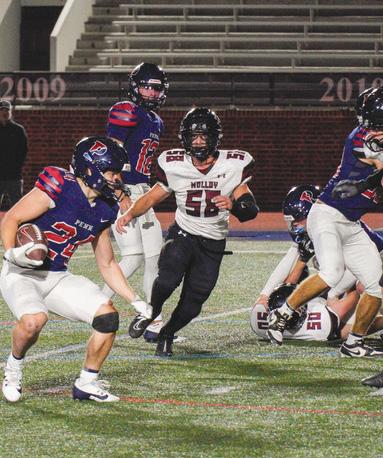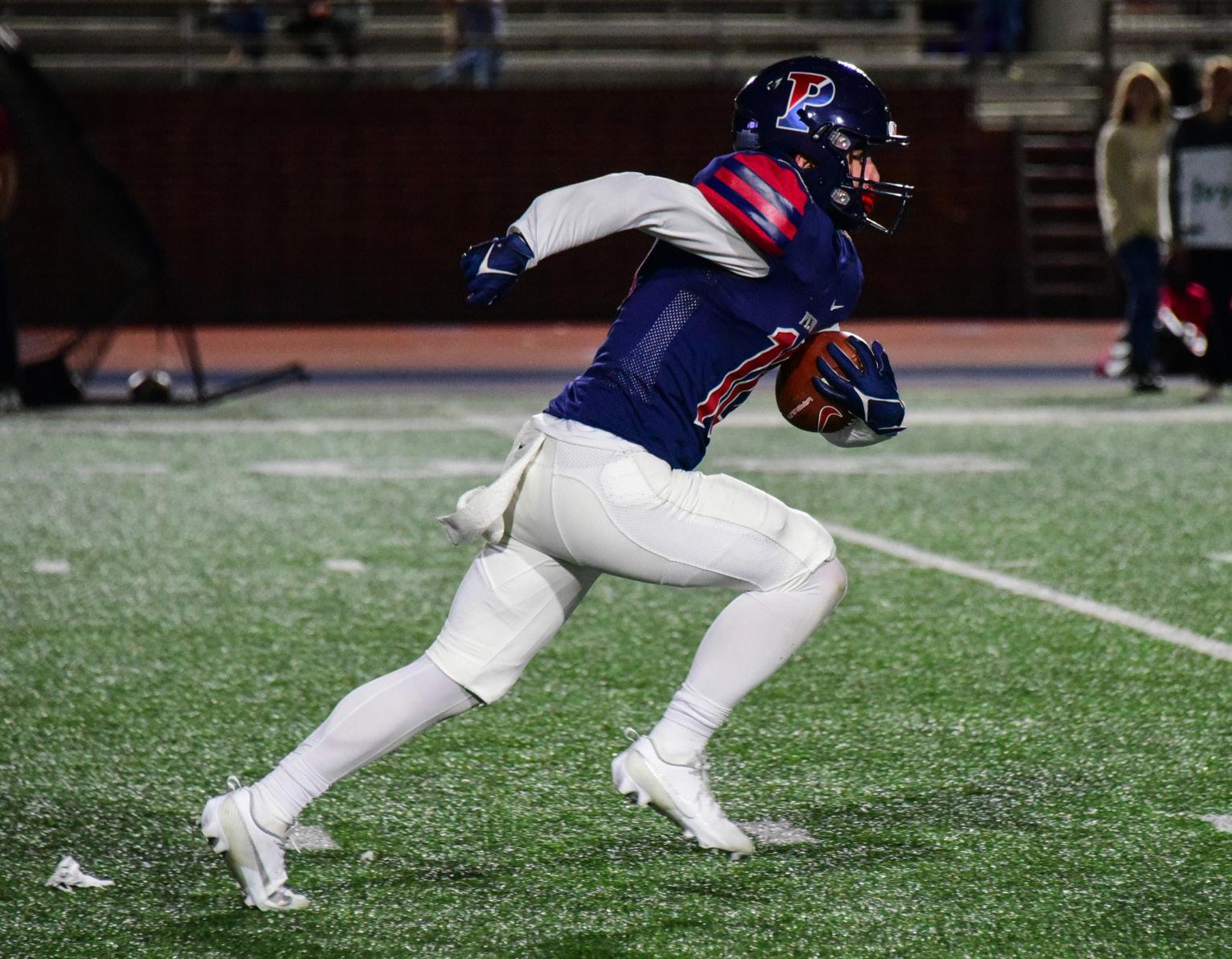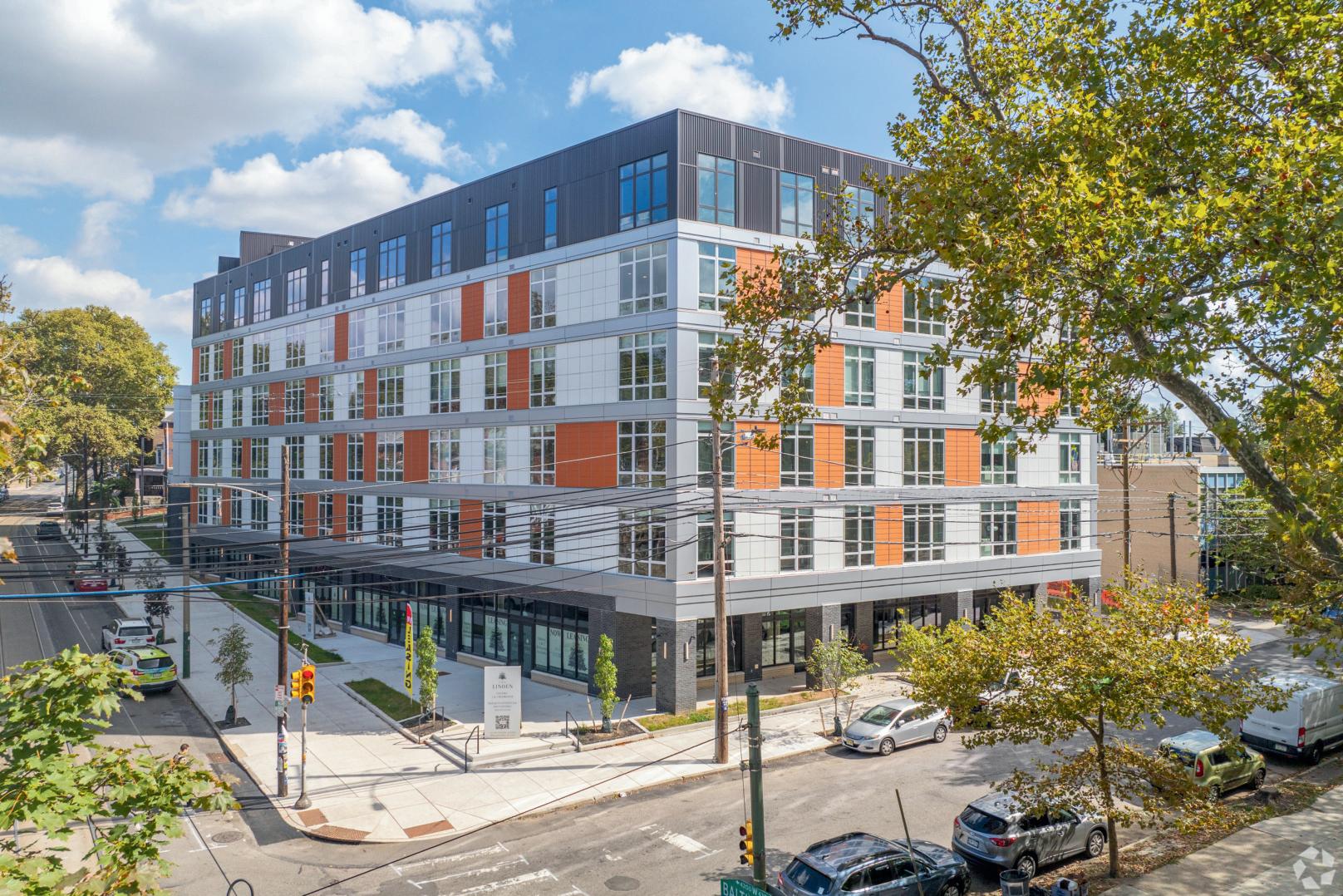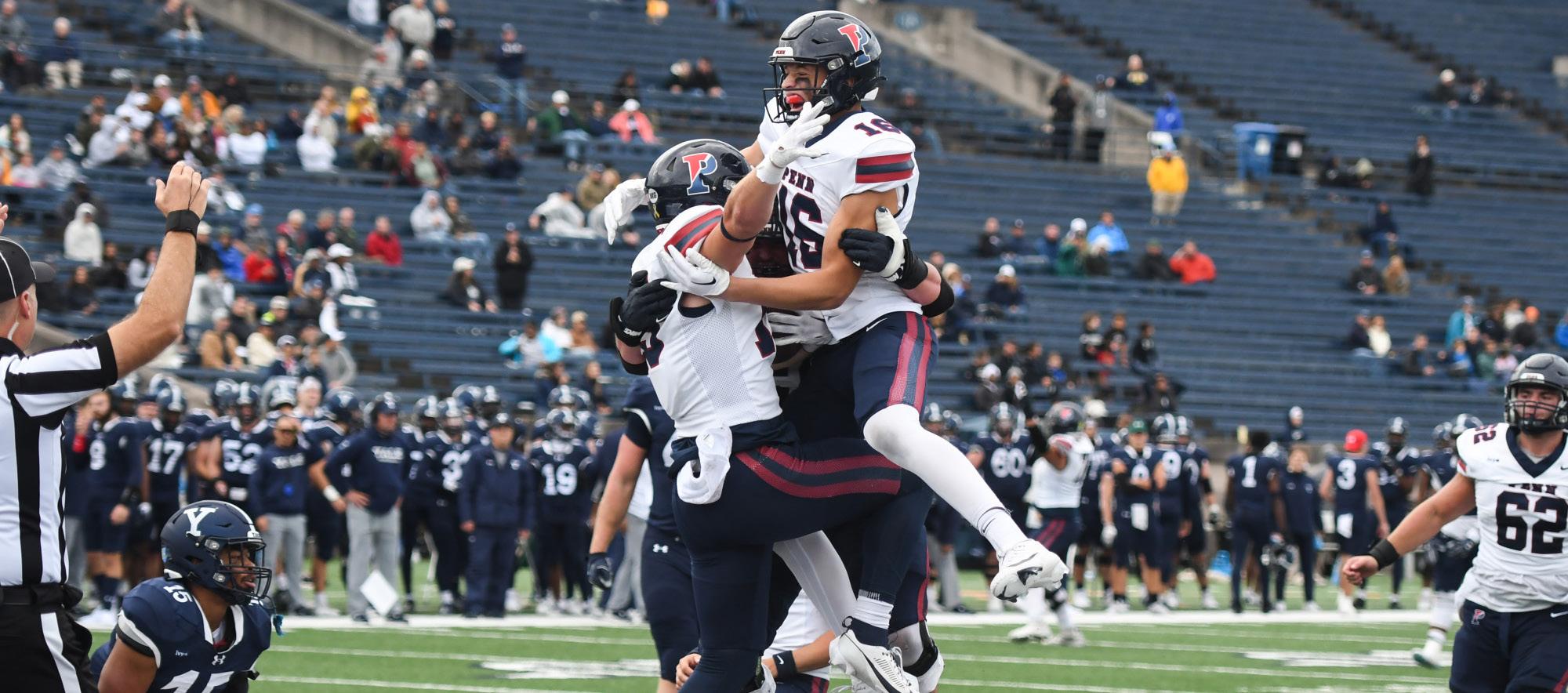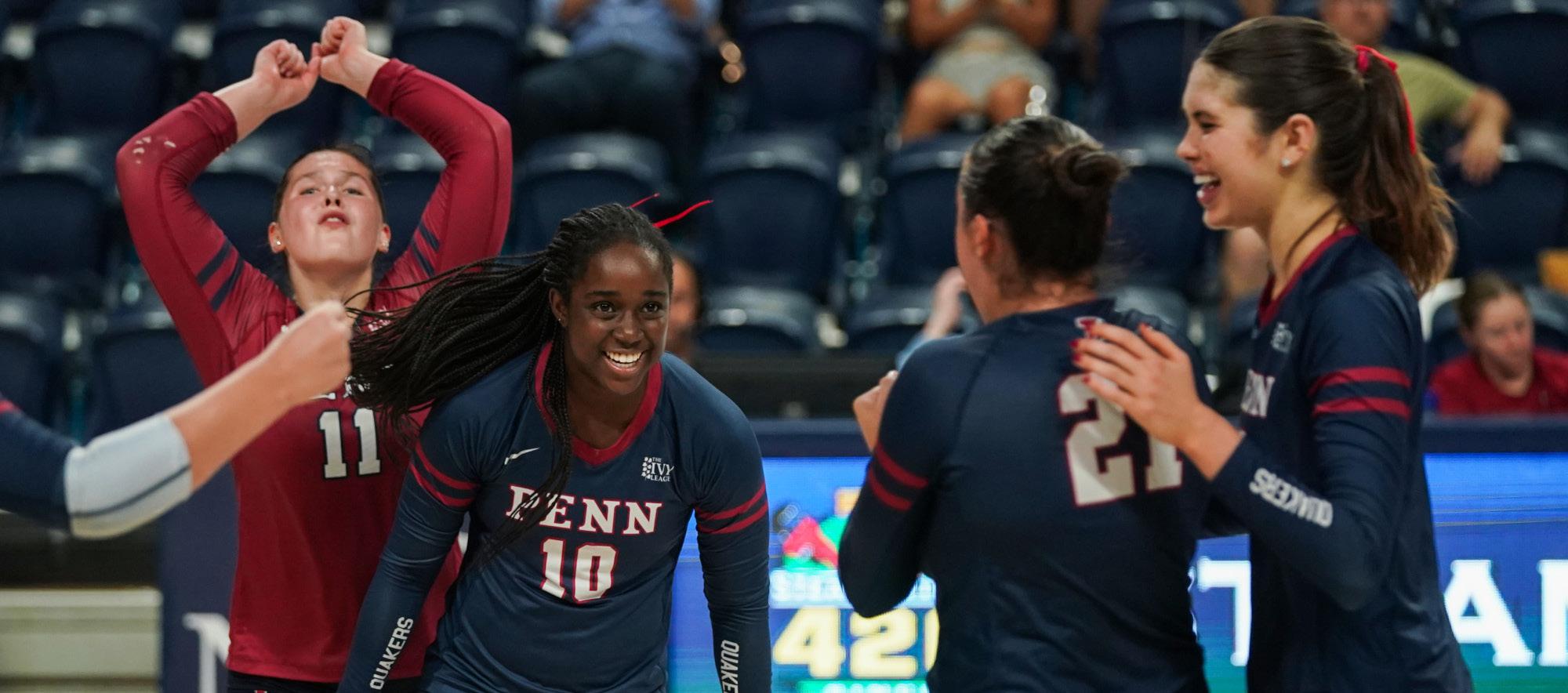EMILY SCOLNICK Senior Reporter
a search warrant at an off-campus residence allegedly home to pro-Palestinian student activists — sparking concern from several community groups and politicians. Penn’s Division of Public Safety confirmed in a statement to The Daily Pennsylvanian that police officers executed the warrant on Friday “at an off-campus location.” At least 12 Penn Police officers and one Philadelphia Police Department officer wearing tactical gear “raided the home” of pro-Palestinian Penn student organizers at 6 a.m. on Oct. 18, according to an Instagram post on Oct. 21 by Penn Students Against the Occupation of Palestine. The DP could not confirm the identity of the individuals involved in the incident. The warrant was reviewed by
the Philadelphia District Attorney’s office, approved by a bail commissioner, and “executed following all proper policies and procedures,” DPS said.
A spokesperson for the DA’s office confirmed to the DP that it had “reviewed and approved a search warrant for a location in West Philadelphia” on Oct. 16 in connection with an “ongoing investigation” led by Penn Police and DPS.
“No request to approve charges has been submitted by Penn Police to our office at this time,” the spokesperson wrote. “If and when that time arrives, we will carefully review the evidence submitted by the appropriate law enforcement authorities and make a fair and just determination.”
The search warrant is related to an incident that took place on Sept. 12, according to The Intercept, when red paint was thrown onto the Benjamin Franklin statue on College Green. At the time, an autonomous group of pro-Palestinian activists claimed responsibility for the vandalism. DPS wrote to the DP that the investigation remains active, according to DPS.
The DP has been unable to obtain a copy of the warrant to clarify the terms of the University’s search despite multiple requests.
Philadelphia Police directed the DP to DPS in response to a request for comment.
According to PAO’s post, officers “stormed the house in full tactical gear” after allegedly pointing a gun at
a neighbor and threatening to break down the door and “point[ed] rifles and handguns” at residents’ heads as they exited their rooms. The post alleged that officers did not show a warrant or provide their names or badge numbers. “[O]ne student was separated and taken in for questioning,” PAO wrote in its statement. “Police also seized this student’s personal device on suspicion of vandalism. This student was released shortly after: no charges were given. No arrests were made.”
PAO called the raid “Penn’s most egregious escalation in its campaign to silence anti-genocide activists calling out Penn’s institutional ties to the genocide of
Penn’s chapter of Jewish Voice for Peace and Penn Chavurah hosted a “Gaza Solidarity Sukkot” on Oct. 22. Students gathered in the backyard of the Penn Women’s Center on Tuesday from 10 a.m. to 3 p.m. to commemorate the lives lost in Gaza. The event took place during the weeklong Jewish holiday of Sukkot, which celebrates the fall harvest. During the holiday, practicing Jews live and eat meals in a sukkah — a booth-like dwelling with a roof made from plant material.
JVP founder and graduate student Maddy Kessler said that the goal of the sukkah was to “create a space on campus anyone can join and be in community for Palestine.”
“We want everyone welcome and for Jewish students to know that there’s alternatives to Zionism and that we can have a viable alternative community that exists beyond Zionism,” Kessler said.
The event began with participants building the sukkah and decorating it with a poster reading “Gaza Solidarity
Sukkah.” Outside of the sukkah, they placed a poster that said “Stop Arming Israel.” Other decorations included paper links, lights, and the Palestinian flag. Posters with photos and descriptions of “the victims of [the] genocide,” as described by a sophomore co-founder lined the frame of the sukkah. This founder requested anonymity due to fear of personal harassment.
A separate College sophomore and member of JVP, who requested anonymity due to fear for personal safety, said that Sukkot has “always been about community,” adding that they have struggled find community recently.
“I don’t feel safe or in community with a lot of people in a lot of other Jewish organizations on campus,” the sophomore member said. “I think it’s really meaningful to be able to have a place where we can go, where we can celebrate the values of Sukkot, the community and everything, even more so in this time where it’s amplified how much we need to be able to be a community with each other.”
See SUKKAH, page 6
Unknown individuals vandalized at least six locations on and near Penn’s campus this week, many of which praised former Hamas leader Yahya Sinwar and one which called to “KILL ZIOS.”
Over the weekend, three signs on campus — located at the ARCH building, Annenberg Public Policy Center — were vandalized with text reading “SINWAR LIVES” and an upside-down triangle. In the three recent acts — two of which were discovered on Oct. 21 and one of which was discovered on the morning of Oct. 23 — the text read “KILL YOUR LOCAL ZIO NAZI,” “KILL ZIOS!,” “SINWAR LIVES,” and “SINWAR STRIKES BACK.” All instances included upside-down triangles.
In response to a request for comment from The Daily Pennsylvanian on the three most recent incidents, a University spokesperson wrote that “the vile language in the graffiti is inconsistent with Penn’s values.” Penn’s Division of Public Safety did not respond to a request
for comment on the incidents.
“If campus policies were violated by a member of our community, consequences for the perpetrator(s) will be pursued,” the University spokesperson said. Earlier in the week, after the first three incidents, the spokesperson said that “this incident is being investigated.” Sinwar, the former leader of Hamas, was killed in Gaza by the Israeli military on Oct. 16. Sinwar played a central role in the planning of the Oct. 7, 2023 Hamas attacks on Israel, during which Hamas killed approximately 1,200 individuals and took another 250 hostage. The upside-down triangle, which is typically red in color, has previously been used as a symbol for a number of notable purposes. It has been used by the pro-Palestinian movement to represent solidarity with Palestinians, by the military wing of Hamas to identify
See VANDALISM, page 3 See WARRANT, page 3
ABHIRAM JUVVADI | PHOTO EDITOR
Penn Police executed a search warrant on Oct. 18 at an off-campus house that pro-Palestinian activists allege belongs to student activists at the University.
KAMALA HARRIS CAST THE TIE-BREAKING VOTE TO PASS THE LARGEST INVESTMENT IN CLIMATE ACTION IN HISTORY.
- 37% IN GREENHOUSE GAS EMISSIONS + 1.5M NEW JOBS + $3,562 INCREASE IN REAL DISPOSABLE INCOME PER CAPITA ELECTION DAY: NOVEMBER 5
THE OTHER GUY SAID CLIMATE CHANGE IS A HOAX INVENTED BY CHINA.
The Silfen Forum featured Salam Fayyad, former prime minister of the Palestinian Authority, and Itamar Rabinovich, former Israeli ambassador to the United States
ALEX SLEN Staff Reporter
Hundreds of Penn affiliates gathered at Zellerbach Theatre at the Annenberg Center for Performing Arts for a conversation between former Israeli ambassador to the United States and former prime minister of the Palestinian National Authority on Tuesday.
The event, titled “‘Waging Peace’: Dialogue and Diplomacy in the Middle East,” was hosted by the David and Lyn Silfen University Forum. The event featured former Israeli Ambassador to the United States Itamar Rabinovich and former Prime Minister of the Palestinian National Authority Salam Fayyad. Over 900 Penn affiliates registered for the event, half of whom were students, according to a University spokesperson. Attendees were required to register in advance for the event, and had to show a Penn ID upon entry.
NPR correspondent and 1989 College graduate Michele Kelemen moderated the discussion. Interim Penn President Larry Jameson gave brief opening remarks, saying “the most important tool to wage peace is education.”
Itamar Rabinovich is Israel’s former ambassador to the United States and served as chief negotiator with Syria in the 1990s. He later served as the president of Tel Aviv University and was a visiting professor at Penn.
Salam Fayyad is the former prime minister of the Palestinian Authority and founder of the nonprofit Future for Palestine. He is currently a senior fellow with the Middle East Initiative and a visiting senior scholar at Princeton University’s School of Public and International Affairs.
Kelemen asked the speakers a variety of questions about the history of the conflict between Israel and Palestine as well as the current state of affairs in the region.
When asked about security, Fayyad said: “Security is as much an Israeli need as a Palestinian need.”
Both speakers emphasized the importance of the upcoming election for the future of the Middle East, and said that parties on both sides of the conflict are waiting to see the results.
Rabinovich offered insights from his time in the U.S. as the Israeli ambassador.
“Americans tend to vote based on their pocketbooks, not foreign policy,” he said. “But in my observation, Americans like to know that the president has the capacity to conduct foreign policy.”
When asked about the future of a potential
two-state solution, Fayyad said that the “current government of Israel is definitely not willing to entertain any discussion of Palestinian statehood of any kind.”
Rabinovich supported President Biden’s plan to bring the Palestinian National Authority — the governing body of the Palestinian autonomous regions in the West Bank — to Gaza to begin negotiations on a two-state solution. Rabinovich also approved of normalizing relations with the Saudis and building what he described as a “counter-axis in the Middle East” to oppose Iran. For the last 20 minutes, Kelemen took pre-submitted questions from the audience about the future of Israeli-Palestinian relations.
Jameson’s opening remarks were followed by a statement from Vice Provost for Global Initiatives and professor of Health Care Management Ezekiel J. Emanuel. Emanuel recalled a conversation he had with a student after the events of Oct. 7, 2023 where the student remarked: “I need more to understand the situation.”
Emanuel said that conversation encapsulated the theme and purpose of the event.
On Oct. 18, Penn Students Against the Occupation of Palestine announced a demonstration against the forum event on Instagram. On Monday, PAO posted an update that the protest had been cancelled. The post called the speakers “genocidal maniacs” not worth “the time and effort of student organizers,” but called on people to boycott the event.
PAO also posted a second time on Instagram, calling Rabinovich and Fayyad “careerist and neoliberal,” while further explaining their opposition to the speakers.The post also described the event as “a space to peddle the Zionist narrative and legitimize the illegal apartheid state of Israel while distancing Penn from its crimes.”
“Salam Fayyad and Itamar Rabinovich are two sides of the same coin committed to expanding the genocidal occupation,” the PAO statement read.
College first year Yagiz Ozenci, who attended the event, said he appreciated the event as “a great opportunity to have both sides presented with equal representation at the same time” as a nonpartisan observer.
“I think it’s such a uniquely amazing experience to be in a university which values knowledge and understanding, especially for those who are curious about the topic,” he added.
WARRANT, from FRONT PAGE
Palestinians,” and “an unjustifiable act of terror.”
The DP reviewed archived recordings on the Philadelphia Police scanner from between 5 a.m. and 7 a.m. on Oct. 18. Multiple recordings on the scanner around 5:55 a.m. suggest that Penn Police responded to a request for a police presence in the Philadelphia Police’s 18th District in an area near Penn’s campus. The DP could not confirm the location of the residence at which the warrant was executed.
PAO also referenced Penn Police’s previous actions against pro-Palestinian protesters in recent months, including when police in riot gear swept the 16-day Gaza Solidarity Encampment on May 10.
“Penn Police’s raid was a deliberate choice made by Penn to instill fear and traumatize their own students,” PAO wrote, adding that Penn says its police intervention has been done “in the name of ‘maintaining order.’”
“Raiding students’ homes is not order,” it wrote. “Penn’s actions are proof that they are afraid of the growing power of the Student Intifada. … We will not stop until Penn divests from the Palestinian genocide, and we will not rest until Palestine is free.”
The University’s execution of the warrant has sparked criticism from local politicians, law experts, and pro-Palestinian groups across the greater Philadelphia area, with some accusing the University of an unnecessarily heavyhanded approach.
2013 Engineering graduate and Pennsylvania state Rep. Rick Krajewski (D-Philadelphia) wrote in a statement on X, the platform formerly known as Twitter, that he “was horrified to learn” of the Friday morning raid, which he confirmed took place in the Spruce Hill neighborhood of West Philadelphia, adjacent to Penn’s campus.
“It is completely unacceptable and disturbing that a dozen officers armed with tactical gear and assault rifles threatened the safety of unarmed young people who are not only students, but our neighbors,” he wrote. Krajewski added that he “take[s] the threat of escalation incredibly seriously” and that his office will continue to monitor the situation.
A spokesperson for Philadelphia City Councilmember Jamie Gauthier wrote in a statement that her office is
A sign outside of Gregory College House was vandalized
VANDALISM, from FRONT PAGE
targets, and historically by the Nazis to mark political prisoners during World War II.
A DPS spokesperson wrote in a statement to the DP that it received a report of graffiti on signage on Oct. 19 on the 200 block of South 36th Street and the 3600 block of Locust Walk — areas corresponding to ARCH and the Annenberg Public Policy Center — and a report on Oct. 20 of graffiti on signage on the 3900 block of Walnut Street.
“Upon discovery, DPS followed standard procedures and notified facilities to initiate clean up,” the spokesperson wrote.
A student who requested anonymity due to fear of personal safety told the DP that they observed a later instance of vandalism while walking to class around 8:30 a.m. on Oct. 21 on 38th Street, below the Locust Walk Bridge. According to a picture obtained by the DP, the text read “SINWAR LIVES” and “KILL ZIOS!” with an upside-down triangle.
The student added that seeing the vandalism was “pretty upsetting” and that “any death threat is of concern,” adding that it “really did take a toll on [their] whole day and whole week.”
The student added that they reported the incident to a Jewish professor, who passed it along to other authorities.
Another instance of vandalism occurred on Spruce Street between 40th and 41st streets across from Penn Chabad’s Sukkah, a festival structure for the Jewish holiday of Sukkot. The vandalism, which was also near the Chabad House, read “KILL YOUR LOCAL ZIO NAZI” with an upside-down triangle. The DP observed the vandalism on the evening of Oct. 21.
The term “zio” has previously been used in a variety of contexts, including as simply a shortened version of “Zionist” and as a euphemism for “Jew.” The term has
been described as antisemitic by a variety of groups, including the American Jewish Committee, Anti-Defamation League, and British Labour Party. The term was first coined as an ethnic slur by Ku Klux Klan Grand Wizard David Duke. When “Zios get fuckt” was graffitied on Penn’s campus during the spring’s Gaza Solidarity Encampment, Interim Penn President Larry Jameson and several other administrators denounced it as “antisemitic” and “especially reprehensible,” adding that it would be investigated as a hate crime.
Chabad House Director Ephraim Levin told the DP that Chabad has been “in touch” with University officials and with law enforcement about the incident. While Levin added that Chabad is “very concerned about what was put there,” he added that does not feel the incident is “representative of the community.”
“I feel this diminishes the light of the community. It’s something that darkens the community,” Levin said, adding that he is trying to “restore the light [and] try to show the opposite of hatred [to] show what Penn is all about: openness and kindness within the community that we’ve always felt at the University.”
The DP observed the most recent instance — reading “SINWAR STRIKES BACK” with an upside-down triangle — early in the morning of Oct. 23 on 40th and Irving streets, adjacent to Gregory College House. Though students first noticed the text early in the morning, it remained present through Wednesday evening.
After the first two incidents over the weekend, the Penn Israel Public Affairs Committee attributed the beginning of the Israel-Hamas war to Sinwar’s “planning and execution” of the Oct. 7, 2023 attacks, describing them as “the largest attack on Jews since the Holocaust,” in a written statement to the DP.
“Anyone who glorifies Sinwar and his terrorism is anti-peace, anti-American, and antisemitic. There is no place for this at Penn,” PIPAC wrote. “We hope that soon, Hamas finally surrenders and releases the hostages they are still holding captive in Gaza.”
“seriously concerned” by the “extreme manner in which” the search warrant was executed.
“From the start of this situation, Councilmember Gauthier has urged every party to de-escalate when possible,” he wrote. “This action seems counter to this goal.”
Senior Program Officer for the Foundation of Individual Rights and Expression Haley Gluhanich wrote in a statement to the DP that although the circumstances surrounding the search remain unclear, “in terms of the First Amendment, if the search warrant was based on opposition to views the individuals expressed, then that would be viewpoint discrimination and would be very concerning.”
She added that if the execution of the warrant “was based on probable cause that the individuals engaged in unlawful behavior … then there would be no First Amendment violation.”
The Penn Law National Lawyers Guild wrote in a statement to the DP that the raid was “an unprecedented violation of students’ rights … to safety and security in their own homes.”
“Penn Law National Lawyers Guild calls on all protectors of free speech and association to condemn this unjustified act of police violence designed to chill students’ rights to protest genocide,” they added.
Several chapters of the national organizing group Students for Justice in Palestine at Philadelphia-area schools have expressed solidarity with PAO following news of the raid.
The Drexel Palestine Coalition wrote in an Instagram post that “the university’s use of militarized force and intimidation tactics … is an outrageous violation of civil liberties.”
“We condemn the cowardly actions of the University of Pennsylvania in issuing police raids against pro-Palestine student organizers,” the Temple University SJP chapter wrote in an Instagram post. “This action represents the most outrageous escalation by the University of Pennsylvania in its draconian campaign of violent censorship.”
Swarthmore College’s SJP chapter wrote that they condemn Penn “for its abhorrent acts of violence and repression against student organizers,” adding that the “calculated acts of repression — pointing guns at students, raiding homes — are meant to instill fear, make us question our safety, and push us into silence.”
“However, Penn Against the Occupation will rise,” they wrote.
PHOTO COURTESY OF THE UNIVERSITY OF PENNSYLVANIA
The 2024 Silfen Forum featured Salam Fayyad, Former Prime Minister of the Palestinian Authority, and Itamar Rabinovich, Former Israeli Ambassador to the United States.
ABHIRAM JUVVADI | PHOTO EDITOR
on Oct. 23.
We are to blame for Penn’s security concerns
UNHINGED | Penn’s Sidechat activists compromise our sense of safety
“Shut the f**k up. You are so pick-me, complaining and screaming racism at every corner possible. Even your name is horrid.”
“If you’re ever a victim of a crime, I don’t want to hear about it.” My use of profanity in this column’s opening isn’t to elicit clicks from potential readers. To be frank, I’m sure that my introduction actually rings a bell for at least some of you. After all, at the time of writing this piece, almost 700 Penn students had approved of these words. These words, almost verbatim, are highly upvoted Sidechat comments critiquing a Daily Pennsylvanian opinion column that argues at face value, “you didn’t ‘earn’ your safety.” The piece addresses student reactions to a PennAlert warning of “SHOTS FIRED” (allegations of gunfire were later denied and the noise was attributed to a vehicle driving over lane delineators). Sidechat’s critiques of the DP, or any Penn-related class, organization, and event for that matter, are not new nor particularly unwarranted. But when have we decided to cross the line from memes about Computer and Information Science and the Penn Marriage Pact to counterproductive, hostile arguments?
For those unfamiliar with the latest developments in communication, Sidechat is an anonymous messaging platform that most often localizes chats to college campuses. It is almost an escrow account for students, functioning as a safe intermediary to facilitate their uncensored thoughts and concerns. In an institution as stratified as Penn, Sidechat is perhaps the only platform on which we can be heard for our ideas alone. In contrast, more mainstream sites like Reddit offer some level of anonymity. But behind each throwaway username, there exist
traces of the account holder in the form of their publicly available posts and comments. And this void is the "raison d'être" for Sidechat’s popularity on Penn’s campus.
Nonetheless, the software has certainly not deflected from bad press. Just a few years ago, Yik Yak — a similar anonymous messaging app that was acquired by Sidechat in 2023 — was shut down after posts featured threats of gun violence, sexual harassment, and discriminatory language.
This isn’t to say that hostile discourse doesn’t occur on more mainstream sites. On any of the DP’s social media platforms, you’re bound to find students, in addition to their parents and alumni, who regularly rail ad hominem attacks against reporters in the comments section. However, Sidechat is considered top-shelf for Penn’s most notorious gossips.
Of course, the concerns of Penn’s Sidechat users are not unfounded; we have a vested interest in preventing violence. Far too often, Philadelphia has consistently ranked among the country’s most crime-ridden cities, with West Philadelphia frequently making headlines for cases of aggravated assault, burglary, and rape. Yet, many of our official, offline discussions address the dangers past 40th Street when the more urgent concern is what happens within our own campus boundaries. And under the guise of fearing that their safety is compromised, Penn students encourage incendiary attacks that are in direct opposition to ensuring a sense of security.
Most nonfatal violent crimes, including those that are politically motivated, involve a perpetrator known to or at least acquainted with the victim. Therefore, when you anonymously display your unfiltered aggression against
Make politics great again
M’S MANIFESTO | What can we actually learn from the presidential debate?
I tried to sit with the Sep. 10 presidential debate for a while. I tried to accept that it was simply politics: bantering, blaming each other, talking nonsense just to make your opponent look bad.
Let’s tell it like it is: The presidential debate was a fiasco. I was surprised to see how neither of the candidates directly answered most of the questions and, instead, kept going off on unrelated tangents. Trump talked nonsense about people eating cats and dogs and having “concepts of a plan.” Throughout the debate, he failed to provide concrete evidence and simply said “She knows that” or “Everyone knows” as if that were enough to prove his point. Harris on the other hand was not much better; she failed to acknowledge the questions, dodging important matters about immigration and the economy while using her story about growing up in a low-income household as a crutch to get through the debate.
Watching the debate with other University students, I was also surprised to see many of them celebrate this banter, worried about whether the University was named or not, excited to see who spat catchier insults.
After watching what I considered to be an ineffective debate, as little politics were actually discussed and very few answers were provided, I started wondering: what is the purpose of politics? What is it that has come to be conceived as politics in our generation? Has it simply become an entertainment for us to laugh about?
In his "Nicomachean Ethics," Aristotle argues that the role of politics is to cultivate virtue in its citizens so that they can perform in accordance with the virtues of the soul, thus becoming happy and fulfilled. Under this perception, the state’s role is to create good conditions for its citizens. Modern politics, especially in this last debate, seem to be little concerned with this.
Information about matters like the economy and foreign policy was lacking. Both of these matters, I consider extremely crucial given the context of the 2024 elections. A great part of American voters have claimed to be highly concerned about inflation, revealing the failure of
“Bidenomics” that caused soaring inflation and interest rates, making it hard for Americans to access essentials like groceries and housing.
So far, it seems like Harris’ economic agenda builds on efforts made by the Biden administration, which may give Americans trouble separating her own policies from unpopular Bidenomics. Yet, during the debate, Harris did little to outline her own policies and instead stuck to her narrative of “fighting for the middle class.”
Northeastern University Political Science professor Nick Beauchamp deemed her plan empty of “anything ambitious” and reflected on the American system’s failure to be able to pass any policies that would actually do any good. Lately, it seems, everything is framed as a tax cut. Moreover, I’m still surprised to see how much the candidates have steered away from talking about foreign policy, even though it’s one of the most pressing issues right now. Beauchamp points out how both candidates were unwilling to talk about these issues, perhaps given their complexity: “There are real disagreements here [referring to foreign policy], but by the time the debate got to them, the audience was unlikely to have been paying much attention.”
It’s true. Even I, someone who cares a lot about American foreign policy given my international status, was bored by the time the debate pivoted towards international politics. I was tired of listening to nonsense banter and incredibly creative ways of dodging questions. When the Russia-Ukraine war was mentioned, I looked up to the TV intrigued as to finally see how they would answer this key question: only for Harris to criticize Trump for his (also) very vague answer. They changed subjects pretty quickly, and I was disappointed to see how no one watching the debate with me seemed to care that many questions were left unanswered.
According to Aristotle, if politics is about prioritizing the citizens’ happiness, a political leader should be concerned about the common good rather than individual rivalries. Yet, this presidential race seems to be
How rural students struggle
to navigate their identity at Penn
PIPER SLINKA-PETKA | Ivy doesn’t grow in Appalachia
During the same conversation all first-year students find themselves in, state follows directly after name. Students, myself included, wait expectantly for one of four common answers: Pennsylvania, New Jersey, New York, or California. Penn’s student body, while diverse, leaves many geographical regions nearly underrepresented in their class.
When I reveal I am from West Virginia, home to Penn students few and far between, I get one of a few responses:
I haven’t heard that one yet. Are you the only one? (No, I am not.)
Like from the song? (Yes, the very state described by John Denver’s 1971 song, “Take Me Home, Country Roads.”)
I have family from Virginia, same thing right? (Two different states, separated in 1863.)
Growing up in Appalachia is an identity I spent my adolescence running away from. Portrayal in the media, such as from vice presidential candidate JD Vance’s Hillbilly Elegy, paints Appalachia as a place for the uneducated, poverty stricken, and lazy. The misinterpretation of rural America creates a narrative that all people inside of it are “white, conservative, and dumb.” In conversations with other Penn students, I would explain my rural upbringing, and end with, “but at least I made it out.”
I felt compelled to abandon my background to find my new place at Penn.
Perhaps the entire purpose of orientation is to emphasize that despite our diverse backgrounds, we are all equal because we are the Class of 2028. What students come to realize, though, is that arriving at Penn does not mean we can easily shed the identity and constraints that have always defined us. Especially for first-generation, low-income and underrepresented students, it becomes increasingly apparent that identity poses larger boundaries for some than others. Penn made it clearer than ever that our backgrounds shape how we fit in — or don’t. It wasn’t the light pollution, lack of nature, or noise that made Penn so different — it was the culture. I found
fellow students, we cannot help but view each other as potential perpetrators.
I realize that by attending an urban institution, we are quite literally a part of the Philadelphia community.
Public streets and transit lines run through campus while even our foliage is part of a broader initiative to reduce stormwater runoff. Can we really fear one another when outsiders also populate student spaces?
Third-party individuals are fundamental to our integration with the broader Philadelphia community. This integration is, in part, driven by the fact that Locust Walk as well as various campus facilities are open to the public. Yet, most academic spaces are privatized. Even non-student staff members of Penn’s integrated research centers are sponsored by the Office of the Vice Provost for Research. To put it simply, nearly everyone on campus
overshadowed by a personal power struggle, trying to make the other candidate look bad. For instance, Trump has been constantly attacking Harris’ racial identity, questioning whether she is “truly Black.” However, this has little to nothing to do with what is at stake during this presidential race. Clearly, there are more important issues to address than the opponent’s race/ethnicity, and if both candidates were good political leaders, they would be concerned with achieving the common good and not with each others’ personal lives.
While it may be argued that the debate is not wholly representative of American politics, it is still a symptom of the political system’s failure. Despite being in a social media era, debates are still a prime way to access political information. Proof of this is the vast number of students that gathered on Sep. 10 all over campus to watch the debate.
Research shows that persuasive messages in debate settings have more significant effects when trying to change attitudes toward lesser-known topics. For
— whether a student or a salaried employee — is eligible for a Penn-affiliated Sidechat profile. The possibility of bad actors lurking amidst our lecture halls and dorms
myself struggling to find an anchor with my urban peers, feeling out of the loop about everything as little as their high school experience to restaurants they loved. I was always a step behind.
My differences were possibly the most apparent at the dining hall. I grew up on simple, hearty foods like pepperoni rolls and baked mac & cheese — nothing like the diverse and unique food options my peers raved about. Penn’s food options felt like an entirely new language. What were the halal food trucks outside of Riepe College House? Could I survive on Hill College House french fries for a whole semester?
The education I received, too, lacked greatly in comparison to my peers. In 2024, West Virginia was ranked the worst state for education. Approximately only 20% of West Virginians over 25 have a bachelor's degree or higher.
While I’d been admitted to Penn, I was still the product of a struggling academic system. Even though I already knew my education put me at a disadvantage, I underestimated how much I would feel out of place at Penn.
Perhaps even more than educationally, I was lacking socially. In my town of less than 3,000, I’d had the same friends since childhood. But, because they’d come from a culture of relentless interaction, Penn students from urban areas were excellent at navigating the transient social situations integral to making friends as a first year. Can I ask someone to get lunch if we’ve just met? Do I wave to them on Locust Walk, or is that only after a certain number of conversations?
It felt like my classmates were all members of a secret club which gave them these answers. I was floating aimlessly in the ocean; they’d made it to shore.
Coming from a geographically underrepresented area meant I was at a disadvantage in navigating Penn. While my classmates seemed to effortlessly adjust to this new world, I felt lost grappling with new social dynamics, cuisine, and academics. The culture shock was not just locational; it was a reminder of how deeply our backgrounds influence our future. Although I felt the need to abandon
example, it was crucial for the voters to consolidate their views about Harris in this debate, given the particulars of her entry into the presidential race. However, when politicians fail to answer questions or approach debates like a rhetorical exercise, they run the risk of spreading misinformation that can eventually lead to a negative outcome for the whole country as voters’ minds are made up.
The American political system won’t change because of this article. But I do believe it is important that we, as young people and students, recognize when political leaders and systems are failing to fulfill their duty. Perhaps, instead of taking it as a form of entertainment, we could start by questioning what the meaning of politics actually is.
MARIANA MARTINEZ is a College sophomore from Bogotá, Colombia. Her email is marmari@sas.upenn.edu
my old life for Penn’s new offerings, I couldn't just put West Virginia behind me. I would have to actively work to bridge the gap between my unique upbringing and my new life at Penn.
Sitting down with a fellow first year and West Virginian, Aneesh Banerjee, he shared my same struggles. He mentioned that coming to Penn brought along anxiety to leave his hometown friends and form a friend group here. He recounts feeling, “jealous of the students from more populated states like New Jersey, Connecticut, and New York because they already knew people.”
Banerjee admits that adjusting to Penn academically was “definitely hard at first.” He felt “at a disadvantage coming from a small state because [the] education system didn’t prepare [him] well for an Ivy League education.” He expressed feeling behind in comparison to his peers that had, “access to all AP classes and had great teachers.”
Which he feels, “helped them stay ahead.” Banerjee came to the same conclusion I’ve realized: that we would have to “work a little harder to catch up.”
Despite the challenging adjustment I, like Banerjee, am growing to recognize that our backgrounds don’t make us any less qualified. In fact, our upbringing gives us a unique perspective and purpose. We need to challenge the
stereotypes that follow rural areas; being country doesn't equate to being ignorant.
The perspectives of rural students deserve to be reflected at Penn. We contribute as much to the University as it contributes to us. While Penn gives us the opportunity to explore the world outside of our borders, this does not mean we must neglect our origins. We can take pride in being rural.
The connections we make at Penn cannot be solely created within geographical boundaries — our similarities aren’t found exclusively in streets we’ve walked along and restaurants we’ve eaten at. We should embrace the chance to intertwine our diverse backgrounds rather than discarding them in favor of a single, collective identity.
No student should ever feel the need to lose an integral part of themselves — even if that part includes pepperoni rolls and country roads. Rural students are essential to Penn because of their backgrounds, not in spite of them. Let’s start believing that.
ABHIRAM JUVVADI | PHOTO EDITOR
Columnist Mritika Senthil comments the security challenges of Penn’s campus.
MRITIKA SENTHIL is a sophomore from Columbia, S.C. Her email is mritikas@upenn.edu.
JOE DWORETZKY | EDITORIAL CARTOONIST
PIPER SLINKA-PETKA is a College first year studying health and societies from West Virginia. Her email address is pipersp@sas.upenn.edu.
JESSE ZHANG | DP FILE PHOTO
Columnist Piper Slinka-Petka explores the cultural differences between her rural upbrining and Penn’s urban culture.
Phila. voters for Harris
At the “Get Out the Early Vote” rally, Ocasio-Cortez and Fain encouraged around 250 attendees to continue canvassing and door-knocking leading up to Election Day
Rep. Alexandria Ocasio-Cortez (D-N.Y.) and United Automobile Workers President Shawn Fain spoke at a Harris-Walz campaign event to mobilize early voters in Philadelphia on Oct. 20.
At the “Get Out the Early Vote” rally, Ocasio-Cortez and Fain encouraged an energized crowd of around 250 attendees to continue canvassing and door knocking in the final two weeks leading up to Election Day. The speakers appealed to the experiences of working Americans and highlighted the importance of union labor, stressing unity and solidarity.
The event was held at a union hall in Center City owned by a local chapter of the Service Employees International Union, and drew a crowd composed primarily of young voters and union workers from the Philadelphia area.
A number of speakers addressed the crowd before Ocasio-Cortez and Fain took the stage, including Vice President at 32BJ SEIU Sam Williamson, Pennsylvania State Sen. Nikil Saval (D-Philadelphia), SEIU union member Tyrone Payne, and actress and activist Danai Gurira. Daniel Vicente, the regional director of the United Auto Workers region that encompasses Pennsylvania, also gave introductory remarks. He highlighted Harris’ pro-labor record as a reason for the union’s endorsement of her in this election, despite what he characterized as the Democratic Party’s history of neglecting “blue collar working people.”
“The reason we are endorsing this woman is because she’s already done it in the past. The UAW wasn’t popular in 2019 like it is now. Kamala was on our strike lines. GM was out on strike for 40 days. Donald Trump was the president at the time. What the hell did he say about the strike? Not a damn thing,” Vicente said.
SUKKAH, from FRONT PAGE
At noon on Tuesday, participants ate lunch catered by Al-Sham — a Palestinian-owned restaurant in West Philadelphia — and communed together to study and read poems about the exile of Palestinians in the sukkah. Attendance at the event peaked around this time, with around 25 community members participating.
“I think despite how the subject matter is dark and hard for all of us, I think it’s important that we have spaces that we can come together, and think about this stuff in community,” the sophomore founder told The Daily Pennsylvanian.
A representative of JVP Philly also visited the sukkah to lead an educational session about Sukkot before encouraging participants to engage in dialogue about their own
Ocasio-Cortez spoke about a number of key issues — including Medicare, the minimum wage, and natural disaster response — that would be decided by the election, emphasizing her desire to “organize” under a Harris-Walz administration rather than “go back to a past of Donald Trump.”
“When we’re being handed conditions where our rights are being taken away, I know that I don’t want to leave anybody else to be making this choice but us. We need to make this choice, and if we sit it out, we’re allowing the same people who made the decisions up to this point continue to make them for tomorrow. We can’t stand that,” Ocasio-Cortez said.
Fain echoed a similar message, saying that organized labor must stand united to win the upcoming election.
“We have a choice in this election. It’s a real simple choice to me. It’s either electing candidates to protect billionaires and sow division among the masses, or we elect someone who fights for the working class and will unite the people,” Fain said.
Several speakers, including Ocasio-Cortez, remarked on the ongoing Israel-Hamas war during the event. The New York representative said that “what [the United States is] doing in Gaza” was “atrocious,” a comment met with cheers from the audience. Ocasio-Cortez stressed that while she may not agree with Harris on “everything” she would rather be “wrestling with Kamala Harris and Tim [Walz] in the White House than with Donald Trump.”
In an interview with The Daily Pennsylvanian, Vicente noted that the war was an important issue for many of his
Gaza Solidarity Sukkot. Around 2 p.m., participants sang Hebrew and Yiddish songs together before taking the sukkah down and vacating the space at 3 p.m. as scheduled.
The representative then spent time in the sukkah, and the sukkah visitors collectively shook the lulav and etrog that the JVP Philly representative provided, according to the sophomore founder. The lulav and the etrog are two of the four species of plants that are traditionally held together during Sukkot, and their shaking in six directions (north, south, east, west, up, and down) is meant to “[encourage] rain to fall and nourish the harvest,” according to the 18doors organization.
The Penn chapter of JVP was founded earlier this month by Kessler and the College sophomore organizer. JVP is a national organization that aims to build a Jewish movement in support of Palestinian liberation. Its network consists of pro-Palestinian Jewish students across the country who develop boycott, divestment, and sanctions campaigns against Israel and “amplify a Jewish voice that insists on freedom for Palestinians.”
union members and young people around the country — including graduate workers at Penn — but emphasized that voters should focus on more than one issue and recognize that Trump poses a “legitimate threat” to democracy and to organized labor.
In her speech, Ocasio-Cortez also emphasized the role Pennsylvania voters will play on Nov. 5, emphasizing that the presidential race will be determined in “places like Philadelphia.” The swing state — and its 19 crucial electoral votes — has attracted numerous visits from both campaigns throughout the election cycle, including former President and 1968 Wharton graduate Donald Trump, who was in Bucks County on the same day.
Multiple speakers commented on Trump’s visit to a Bucks County McDonald’s earlier that day, contrasting his socioeconomic background with Harris’.
“Today, Donald Trump, a 78 year old who’s never earned a real paycheck in his life, was putting on a show playing dress up at McDonald’s to act like he is one of us,” Fain said. “Kamala Harris doesn’t have to put on a show. She doesn’t have to play dress up at McDonald’s because she actually wore the uniform.”
Kessler told the DP that she started the organization to provide a space for anti-Zionist Jewish students at Penn to come together.
“I can imagine there are young Jews out there, too, like at Penn, who are feeling alienated because everyone around them is cheerleading a genocide, or is just quiet and passive in the face of a genocide,” she said.
Kessler added that one of the organization’s biggest challenges thus far has been recruitment, citing the “systems that are in place” as holding the JVP chapter back. The sophomore founder told the DP that while the group applied to become a recognized student group on PennClubs last week — the application has not yet been approved by Penn.
About 18 JVP chapters across the United States have set up sukkahs at college and university campuses — an action that has been met with mixed responses from college administrators. Administrators at Northwestern University and the University of California at Berkeley ordered police officers to tear down Gaza Solidarity suk-
Lucas Eisen said he was excited to see Ocasio-Cortez at the event, calling her “emblematic of a new generation of leadership.” Eisen also noted that election enthusiasm on Penn’s campus has been “consistent,” and said “it’s been exhilarating” to be in Philadelphia during an election. When asked about her message to Philadelphia college students in the election, Ocasio-Cortez told the DP that the presidential race would be determined by the “respective enthusiasm” of both parties’ bases.
“Youth turnout is going to be critically essential. We saw this in 2020. Young people turned Pennsylvania for the victory of President Biden, and we need young people to turn Pennsylvania for the victory of Kamala Harris,” Ocasio-Cortez said.
Fain referenced Penn’s graduate student workers union — who voted overwhelmingly to unionize earlier this year — in
kahs in recent days.
At Brown University, students received a permit allowing them to set up their sukkah on the green, but later slept in the structure as a form of protest against “the administration’s threats.” The university said that the students’ requests had not indicated any plans for sleeping in the structure and that sleeping in the sukkah was “prohibited per long-standing University policy.”
“It’s rare that organizers are able to meet with a relative sense of security and [the] feeling that they can relax, [and] that’s what this sukkah’s meant to do,” the sophomore member said.
Other Jewish organizations at Penn have also set up sukkahs to celebrate the holiday. Penn Chabad’s sukkah has been set up on Locust Walk since Oct. 17 and will remain through Wednesday, and Penn Hillel’s sukkah was put up on Oct. 14 and will remain through Oct. 26. Both sukkahs are intended to honor the holiday of Sukkot.
“We were able to do Sukkot our style, and I think we pulled it off,” the sophomore founder added.
ANASTASIA RUSSELL | STAFF PHOTOGRAPHER
Rep. Alexandria Ocasio-Cortez (D-N.Y.) speaks at a rally in Philadelphia on Oct. 20.
was forced to temporarily cease operations after receiving a notice regarding numerous health code violations on Oct.
Ochatto ordered to temporarily close following nine health code violations
The restaurant accumulated a total of nine violations of the Philadelphia Health Code, according to an inspection report available on the Philadelphia Department of Public Health’s website
JASMINE NI Senior Reporter
Ochatto Hand Drawn Noodles, Japanese Cuisine, and Bubble Tea was ordered to cease operations by the City of Philadelphia’s Health Department on Oct. 21 following numerous health code violations.
Ochatto — which is located on Chestnut Street and is a popular BYO spot for Penn students — has been ordered to temporarily close until corrective actions are taken, according to a notice posted on the door of the establishment. The restaurant accumulated a total of nine violations of the Philadelphia Health Code, according to an inspection report available on the Philadelphia Department of Public Health’s website.
The notice stated that all operations at the establishment had to stop immediately, with occupants required to vacate the premises by 2 p.m. on Oct. 21. Anyone found occupying the restaurant after that time, except those addressing the violations, would be in violation of the order and subject to arrest, according to the notice. Violations included blocked handwashing sinks,
a failure to provide parasite destruction records for sushi-grade fish, and evidence of pests throughout the establishment’s facility, according to the inspection report. The report specifically noted the presence of live roaches, a dead mouse, and drain flies in various food prep areas, with mouse droppings and debris found throughout the restaurant.
The Department of Health has mandated that Ochatto correct the violations and undergo a reinspection before resuming operations. According to the notice, the restaurant is required to close for a minimum of 48 hours and pay a reinspection fee. The establishment has the option to appeal the closure within 10 days.
Ochatto’s management did not respond to a request for comment by the time of publication.
Greek Lady, another popular restaurant near Penn’s campus, was also shut down by the Department of Health on Oct. 16 due to 19 health code violations, including improper food date marking, inadequate sanitation, and lack of a valid food license.
Students eating at Franklin’s Table on Oct. 18, 2023.
Each restaurant is closing its doors just shy of two years since they opened at Franklin’s Table
SOPHIA NEAMAN Staff Reporter
Two popular eateries at Franklin’s Table Food Hall on Penn’s campus will close at the end of this month. Local cheesesteak spot Delco Steaks and hoagie restaurant High Street Hoagies each announced their closures in recent weeks from the food hall at 34th and Walnut streets. Delco Steaks is closing its doors just shy of two years since they opened at Franklin’s Table, while High Street Hoagies has held a stall in the food hall for six years. Delco Steaks suddenly closed its doors earlier this month. Management did not respond to requests for comment. High Street Hoagies announced its closure on Oct. 14 in an Instagram post, adding that they will “continue to serve the Penn community through our catering services and our other restaurants.”
“We are deeply grateful to the Penn and University City communities, as well as the other vendors with whom we have developed deep friendships,” High Street Hoagies wrote in the post. They added that they plan to open a similar restaurant concept in Center City soon.
The restaurant originally opened in 2018, but was previously known as High Street Provisions. High Street Hoagies management did not respond to a request for comment.
Wellness at Penn vaccinates 7,300 community members at annual flu clinic, a decline from last year
The annual clinic, which offered free u vaccines to all Penn community members, was hosted at the Gimbel Gymnasium in the Pottruck Health and Wellness Center from Oct. 16-18
GABRIEL STEINBERG Staff Reporter
Wellness at Penn’s annual campus flu clinic vaccinated approximately 7,300 Penn community members this year, a reduced turnout compared to last year’s figure of over 10,300.
The annual clinic, which offered free flu vaccines to all Penn community members, was hosted at the Gimbel Gymnasium in the Pottruck Health and Wellness Center from Oct. 16-18. This year’s clinic was “Philadelphia” themed, with soft pretzels, Tastykakes, and a special appearance by Gritty, the Philadelphia Flyers’ mascot.
According to Rebecca Huxta, Wellness at Penn’s director of public health, more than 5,400 of those vaccinated this year were students and around 1,800 were faculty or staff of the University.
Wellness at Penn reported that the average turnaround time — measured from entry of Pottruck to the exit of Gimbel Gymnasium — across all three days was 7.5 minutes, with the busiest times being the lunch hour from 12 p.m. — 1 p.m. and the closing hour of 5 p.m. — 6 p.m.
The undergraduate school with the highest percentage turnout was the School of Nursing, and the graduate school with the highest percentage turnout was the School of Dental Medicine. Both schools had 56% of their student populations vaccinated at this year’s clinic.
Wellness at Penn took into account suggestions from their flu clinic attendance survey after last year’s clinic in deciding this year’s theme. Attendees were offered soft pretzels and Tastykakes after receiving their shot, took pictures at the “Philly Fights Flu” balloon wall, and listened to Philadelphia-inspired music.
Huxta wrote that this year’s theme “fit into the University’s focus on belonging and the University’s vision for In Principle and Practice.”
“Getting vaccinated helps protect your neighbors, reminding us we’re interwoven and interconnected; [it] shows you are an anchored Philadelphia and Penn citizen, and keeps you engaged in your studies,” Huxta wrote.
Wellness at Penn also invited undergraduate nursing students to volunteer with their instructors to support
vaccine preparation and administration. Huxta described this opportunity as a “unique clinical experience for these students working a large scale, campus wide public health event.”
A School of Nursing student administered the flu vaccine for Interim Penn President Larry Jameson at the year’s clinic.
In the fall semester of their senior year, Nursing students learn about community medicine and have their clinical placements at a variety of community health centers around the Philadelphia area. In place of a clinical rotation for one week, students have the option to volunteer at the flu clinic.
Nursing senior Kate Cerniglia said that she was lucky to be able to help with the flu clinic this year, adding that there was a higher demand than the number of spots available for Nursing students at the flu clinic.
“I loved my experience volunteering at the flu clinic. I’ve had a few opportunities to give [intramuscular] injections — flu vaccines are IM injections — in clinical, but they were few and far between. It was a really great opportunity to get a lot of practice,” Cerniglia said.
Several Nursing students who administered shots encouraged their friends to get vaccinated.
“It’s definitely a unique experience because you get to give vaccines to your friends. It’s one of the only chances at Penn when your friends can actually see what we do in nursing,” Cerniglia said. “It also works as immersion therapy if you are a little scared to give vaccines. Giving vaccines to people you know really forces you to overcome any fears about that.”
Huxta added that a new electronic medical record system made it easier to handle the documentation of immunizations, meaning that students who attended the flu clinic will have their flu vaccine documentation uploaded to their Wellness portal.
Wellness at Penn will be hosting a COVID-19 Booster Clinic from Nov. 13-15, available to Penn community members who register in advance for an appointment.
Delco Steaks originally opened at Franklin’s Table in December 2022 after opening its first restaurant in March 2020 and featuring a menu that utilizes locally sourced meat and dairy ingredients. The University City location became the business’s first in Philadelphia.
Delco Steaks faced controversy in January 2023, when the business announced a promotion for free cheesesteaks if Penn Basketball scored 80 points and won in a game against Harvard that month. However, when students arrived at the restaurant after the game, the restaurant was closed due to a sink being repaired. The Daily Pennsylvanian was unable to confirm claims that the restaurant was evicted from its spot in Franklin’s Table or was combatting financial issues.
Franklin’s Table is operated by Shop Penn, which has more than 75 outlets. Center for Creative Works, a store filled with handcrafted artistic pieces, and Cork & Candles, a BYOB candle making experience, are among the retailers that have most recently joined the Shop Penn community.
Franklin’s Table’s remaining food stalls include DK Sushi, Goldie Falafel, Papermill Fresh Asian Kitchen, Pitruco Pizza, and Yi Fang Fruit Tea.
ABHIRAM JUVVADI | PHOTO EDITOR
Ochatto
21.
RIYA MITRA | STAFF PHOTOGRAPHER
Penn’s annual flu clinic ran from Oct. 16 to 18.
CHENYAO
career than by NIL, he also said that he anticipated that his choice could have a domino effect in the conference at large.
“For me, I would be lying if I said I didn’t know [my decision] would have some kind of effect down the line,” Dingle said. “It’s something that was in the back of my mind. … I was just trying to do what I thought was best at the time, and that’s what these kids are doing now. … They have a lot of money on the table.”
During his time at St. John’s, Dingle scored high-dollar NIL deals with brands like Bose and Applebee’s. According to the NCAA’s NIL dashboard, the average men’s basketball starter in a power conference earns roughly $171,000 annually through NIL opportunities, while the average among the rest of Division I is roughly $20,000.
By contrast, Dingle said that his NIL opportunities were limited at Penn, with many of the benefits amounting to “some free meals or some clothes.” One such partnership was the men’s basketball team’s deal with since-defunct cheesesteak chain Delco Steaks, which involved the team handing out coupons on Locust Walk. Though Slajchert stayed at Penn for all four of his undergraduate years before being forced to transfer due to the conference’s ban on graduate student-athletes, he recalled a similar experience.
“At Penn, for me, NIL was a non-factor,” Slajchert said. “I had a few small deals where I would post something on Instagram and get 50 bucks — I think I did that once or twice.”
After Dingle’s departure, many in the Ivy League came to its defense. Penn coach Steve Donahue called Dingle “an outlier,” while Yale’s James Jones said NIL had “not done anything to Yale basketball.” Soon after, both teams lost stars to the portal. All eight Ivy League men’s basketball coaches declined to comment for this story.
Men’s basketball also faces a heightened portal risk compared to other sports due to its significant value at larger schools. According to the NIL dashboard, men’s basketball players earn the most money per player of any sport.
“Basketball players good enough to make it are going to get a lot of money,” Wharton Statistics professor Abe Wyner, who also heads the Wharton Sports Analytics and Business Initiative, said. “And if we bump into one [in the Ivy League], they’re going to get a lot of money elsewhere.”
Not every Ancient Eight team lost its stars to the portal. Notably, Princeton managed to retain last season’s Ivy League Player of the Year, Caden Pierce, as well as All-Ivy first teamer Xaivian Lee, who tested the NBA draft waters before returning to the Tigers.
Brown also kept its two All-Ivy selections, Kino Lilly Jr. and Nana Owusu-Anane; the latter was successfully lured back to Providence after initially entering the portal.
The Tigers and Bears combined to receive all 16 first-place votes in this year’s Ivy League preseason poll. In a sport where an individual player makes such a marked impact on their team, keeping top talent is key to competing on the League level. But for the conference as a whole, maintaining its place in the national pecking order could mean sacrificing on the long-held Ivy League tradition, a price the conference may not be willing to pay.
“Those Ivy League values, I think they will hold the league back in terms of competing athletically,” Slajchert said. “Which is okay if the Ivies don’t mind sacrificing [athletic] success.”
As the conference decides what it values most, athletes are forced to make a similar evaluation. Defenders of the Ivy League way have long touted the conference as an unparalleled long-term investment in one’s career, but Wyner says that in the age of NIL, the Ivy’s leaves aren’t quite so green.
“The Ivy League has always had an appeal because of the long-range value of an Ivy League degree,” Wyner said. “NIL is reversing that. So if you can get a big chunk of money from another school, you can arguably say it overcomes the advantages you get outside of it. … This is the only opportunity in their lives to capitalize [financially] on their success.”
In a statement to The Daily Pennsylvanian, Penn Athletics and Recreation wrote that it is “supportive of NIL opportunities for student-athletes when they are aligned with the frameworks of Ivy League values and NCAA policies.” It also emphasized the school’s steadfast belief in the value of Penn’s “world-class education,” alongside athletic opportunity. Penn Athletics did not respond to specific questions from the DP about the expansion of NIL efforts or the formation of an NIL collective.
Some believe the Ivy League can survive without compromising on its current model. Wyner says that while high-major schools may poach the Ivy’s “creme de la creme,” the bulk of the conference’s recruiting will survive. Dingle emphasized the quality of the conference’s coaching, crediting Princeton and Yale’s schemes for their recent success in the NCAA tournament. Slajchert says that he never would have left Penn if he did not have to. In this way, the League can feel confident in the merits of its existing approach.
But next spring, when a new class of Ivy Leaguers faces a life-changing dilemma, the conference must be prepared for the consequences.
“The Ivy League is losing kids to high-major schools that are offering them NIL collective money — money the Ivy League just isn’t ready to support yet,” Slajchert said. “And I don’t know if it ever will.”
ANNA VAZHAEPARAMBIL | SENIOR PHOTOGRAPHER
Coach Steve Donahue reacts to a call made against Penn during the third game of the Cathedral Classic against Delaware at the Palestra on Nov. 27, 2022.
FOOTBALL , from BACKPAGE
John Lista, will face off against a ground attack anchored by running back Josh Pitsenberger, who is third in the standings for most rushing yards with 336. But, last week against Columbia, Penn shut down Columbia running back Joey Giorgi to only 49 yards. They held all of Columbia to under 100 yards — a good omen for limiting Yale’s offensive potency.
Furthermore, the Quakers will look to stop the Bulldogs’ new starting quarterback Grant Jordan. After a blowout loss to Cornell, they gave Jordan the nod. Despite never seeing very limited game action his first three seasons, Jordan has adjusted into the role well, putting up a five-touchdown performance in a shootout against Dartmouth. His star receivers include David Pantelis and Mason Shipp, the former of whom is top five in receiving yards in the Ivy League.
“They are a very senior-led team. We just got to make sure we focus on ourselves and do that,” coach Ray Priore said. “At the end, it takes a lot of series of one plays, obviously collected together to win it. And we just saw the short end when you lose your games by less than the touchdown.”
The team has been focusing on execution in
VOLLEYBALL , from BACKPAGE
offense with precision, tallying 32 assists while also chipping in five kills on 10 attempts without errors, contributing toward a .500 hitting percentage. Moore also added nine digs, three service aces, and a solo block. Freshman outside hitter Ellie Siskin extended her streak of double-digit kills to four matches, recording 10 in this contest, along with eight digs, three service aces, and a block assist. Columbia fought hard, with outside hitters Hailee Watts and Amanda Holsen each putting down 15 kills to keep the Lions competitive, but Penn’s firepower and defensive resilience proved too strong. Freshman right-side hitter Jenniya Lane also contributed to the Quakers’ efforts, hitting .500 with three kills and providing four blocks. Penn started the match strong, taking the first set 25-19 with consistent play. The second set,
‘What I thought was best’: Jordan Dingle explains departure from Penn men’s basketball in DP interview
The former Ivy League Player of the Year re ected on the Ivy League, NIL, and how the conference can survive
WALKER CARNATHAN Sports Editor
“I was just trying to do what I thought was best at the time, and that’s what these kids are doing now.”
In April 2023, then-junior Penn men’s basketball guard and reigning Ivy League Player of the Year Jordan Dingle announced he would enter the transfer portal for his final year of collegiate eligibility, making him the first in what has since become a wave of star-undergraduate transfers out of the Ancient Eight amid the growing prevalence of Name, Image, and Likeness in college sports.
In an exclusive interview with The Daily Pennsylvanian, Dingle spoke about his departure for the first time, discussing the factors that motivated his decision, his place in the Ivy League’s current inflection point, and how the league can survive in a college sports landscape dominated by big dollars.
Since the United States Supreme Court’s unanimous 2021 ruling that allowed NCAA student-athletes to earn profit from “education-related benefits,” the prevalence of NIL deals in college sports has steadily risen. As of August, the NCAA’s NIL data dashboard indicated that men’s basketball is the highest-valued sport per player, with the average athlete earning roughly $65,000 annually. That number is even larger when segmented to the power conferences, with the average Power 4 men’s basketball player bringing home $171,000.
said. “I realized the potential there was with [NIL at larger schools] once I actually entered the portal, but going into it, that didn’t really factor into my decision. … I was looking for the best situation to help me with my basketball career.”
Dingle’s perspective on the other side of the portal is one shared by other high-profile Penn athletes. Even recent graduate and former Penn women’s basketball guard Kayla Padilla, who sought to maximize her NIL potential, noted that the transfer process for her graduate year allowed her to see “what [she] might have missed out on” at Penn.
While Dingle’s departure may have been motivated by his professional aspirations, it nonetheless opened the door for an exodus of Ivy League stars that many theorize is motivated by NIL. Last spring, the league lost four undergraduate transfers to high-major schools, with Penn’s Tyler Perkins, Harvard’s Malik Mack and Chisom Okpara, and Yale’s Danny Wolf exiting. Perkins and Mack were the first pair of freshmen to transfer out of the Ivy in the same offseason since 2012.
“I want to say good luck to all the athletes that had the courage to follow what they thought was the best move,” Dingle said. “You have a lot of people who will question it, and they’ll say all types of things about walking away from an Ivy League degree. … It’s hard to make that decision.”
practice — limiting penalties, making those key catches, setting players in the right position to intercept the ball, protecting the football. Limiting turnovers will be key against a strong Yale defense that has forced six fumbles and five interceptions thus far. And, as always, it has been a focus for senior quarterback Aidan Sayin in practice this week.
Sayin currently sits 365 yards behind the all-time leading passing-yards record. Last season, he lit up the Yale defense with 364 yards and two passing touchdowns. That same game, Richadson had 191 yards and a touchdown off of 17 receptions. It was a big game for the offensive duo. But in regards to this year, senior wide receiver Julien “Juice” Stokes and junior Bisi Owens will likely be strong contributors.
“Just be on the same page, talk, communicate,” Sayin said of the strategy of him and the receivers.
“And if we do that, they can’t cover our receivers.”
The Red and Blue will need a big game from both sides of the ball to tie it all together. But despite the defeats in Ancient Eight play, the team’s faith is not shaken. The team knows exactly who they are.
“We just need to execute better on both on all aspects of the game. We’re so close. We played two real good football teams,” Priore said. “We’re a good football team. We just got to show it Friday night.”
The stars will shine on Franklin Field for a Friday Nights Lights matchup airing nationally on ESPNU. Only time will tell who will shine the brightest.
however, was a back-and-forth battle that Columbia pushed to the brink. After fending off six set points, Penn finally pulled through with a dramatic 34-32 win. This exhausting set paved the way for a more comfortable third set, where Penn secured the victory 25-18 to complete the sweep.
“Overall, probably not one of our cleanest matches,” coach Meredith Schamun said. “We definitely struggled in passing and first touch overall. Offensively, though, we were very good. Attacking wise, we were very strong, so we made up for some of those holes in our first touch.”
With this win, Penn improved to 10-7 overall and 4-4 in Ivy League play, while Columbia remains winless in conference action at 0-7, dropping to 3-12 overall. This marks the fourth time this season that the Quakers have split an Ivy League weekend.
“We really needed this dub tonight,” Moore said.
“I’m glad we could bounce back from last night. This win is big because it makes us fourth in the Ivy and sets us far. This year, we are ready to win.”
After a week off, Penn will return to action on Nov. 1, when it travels to face Brown in Providence.
Dingle, whose 23.4 points per game ranked second in the NCAA in 2023, attested that highdollar NIL deals were largely absent during his time in the Red and Blue.
“They certainly weren’t anything all that lucrative,” Dingle said of his NIL opportunities at Penn. “Myself and my teammates, we had a couple of small things that we were able to do that maybe got us some free meals or some clothes … but I don’t know that any of us had anything that was significantly valuable from a monetary perspective.”
One of the primary factors behind the Ivy League’s dearth of NIL opportunities is the league’s lack of NIL collectives. At big-time schools across the country, donors pool their money into a fund designed to help facilitate NIL deals for their athletes, resulting in a greater volume of available earnings.
St. John’s, where Dingle played his final year of collegiate basketball, has multiple collectives, including the Johnnies Collective and St. John’s UNLIMITED. Funds like these have allowed wealthy alumni, such as billionaire Mike Repole, to funnel millions of dollars into the pockets of Red Storm athletes.
The school’s institutional commitment to NIL has also been strong and swift: The men’s basketball team at St. John’s will play in a first-of-its-kind $1 million NIL tournament in 2025, while St. John’s Peter J. Tobin College of Business recently unveiled a new NIL course of study. That approach, Dingle said, made a significant difference in his NIL experience — one that saw him land endorsement deals with Bose and Applebee’s, among others.
“There was tremendous efforts across the board,” Dingle said. “[From] the athletic director to even coach [Rick] Pitino taking time out of his own personal life to go do promotional events, showing his face, and taking time out of his busy schedule to make sure that we were able to get any extra thing that we needed. They really did put their best foot forward.”
While NIL was a key aspect of teams’ recruiting pitches once he was in the portal, Dingle attests that his decision to transfer from Penn in the first place was motivated by a desire to further his basketball career. After his dominant junior season, Dingle declared for the NBA draft while maintaining his collegiate eligibility. However, he was not projected in the top-60 league prospects.
Following that evaluation, Dingle embarked on a journey into the portal, where he discovered the level of financial opportunity available elsewhere.
“The NIL potential wasn’t one of the things that made me decide to leave Penn,” Dingle, who now plays for professional Serbian club KK Vojvodina,
“For me, I would be lying if I said I didn’t know [my decision] would have some kind of effect down the line,” Dingle continued. “It’s something that was in the back of my mind.”
Many critiques of Dingle and other Ivy defectors have centered around the conference’s long-held trump card: the long-term benefits of an Ivy League degree compared to the short-term appeal offered by larger schools. When Dingle transferred, he was one year away from earning a degree from the Wharton School.
Dingle said he recognizes the merits of a Penn diploma, but that the perks of an Ivy education are not solely reserved for its graduates.
“I don’t have the paper with the University of Pennsylvania’s name on it, but I have relationships that will last a lifetime,” Dingle said of his experience with Penn alumni and classmates. “[An Ivy League degree] is absolutely amazing. But for those who walk away from it, I hope that they’re able to benefit from some of the incredible people that have gone to these Ivy League schools.”
To contend in modern college sports, Dingle said that the Ancient Eight will have to consider its lack of athletic scholarships — an issue he said “shouldn’t even be a discussion anymore.” Dingle added that the practice of abstaining from scholarships, which was recently upheld against a yearslong lawsuit, places a significant financial burden on student-athletes and their families.
Dingle also said that it is easy to understand athletes’ desires to transfer, especially if they “have a lot of money on the table” to play elsewhere.
But as Dingle assesses the state of the conference, he believes there is a path forward. Despite its current state of turbulence, the Ivy League has won games in each of the last two NCAA tournaments, including victories over high-major opponents like Arizona and Auburn. And the driving force behind those victories isn’t going anywhere, Dingle said.
“I think there would be more difficulty getting highly ranked, big-name prospects …” Dingle said of the Ivy’s current model. “But the substance of the Ivy League isn’t having five-star players. … The talent really is with these coaches, like James Jones over at Yale and Mitch [Henderson] over at Princeton, there’s amazing coaches who have great schemes that have stood the test of time.”
“I think that’s really what makes up the competitiveness of the Ivy League, which is why [Yale and Princeton] have had so much success in the postseason,” Dingle said. “So as long as the Ivy League coaches are still there — those passionate and dedicated about basketball — I think the Ivy League will always be a force to reckon with nationally.”
CHASE SUTTON | DP FILE PHOTO
Former Penn men’s basketball player Jordan Dingle spoke to the DP about his departure from Penn.
